reading Homestuck in 'real time' from April 13, 2024 to April 13, 2031. join in any time. currently on: Act 5 (2010) navigation | discord
Last active 4 hours ago
Don't wanna be here? Send us removal request.
Text
July 3, 2010
Homestuck Day 354
New Pages: 2146 - 2154
% Completion (Pages): 26.49
% Completion (Time): 17.48
3 notes
·
View notes
Text
Mysterious Spooky Girl vs Mysterious Spider Girl
(page 2132-2145)

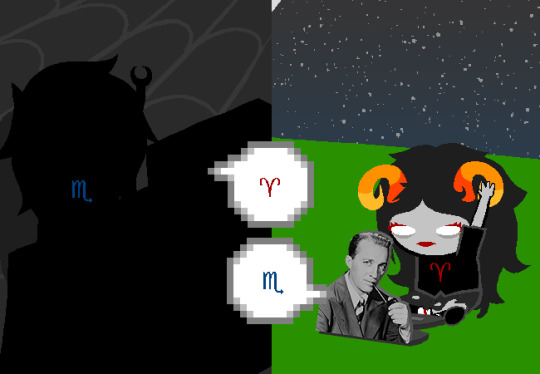
Hello to Aradia Megido! How lovely to meet another troll, see her bedroom and learn all about her interests. I mean, what? No bedroom? No interests? In my webcomic about kids hanging out in their bedrooms and expressing their interests?? What is going on here.
The command to ‘Render [Aradia] in a more symbolic manner’ (p.2133) is the first time Homestuck has drawn attention to specific art styles, although it’s similar to Spades Slick needing to flip his sprite so that Droog could patch up his eye (p.1300). There, it was a ‘rule’ that Slick’s sprite had to be facing the same way as his effigy, and here it’s a ‘rule’ that we cannot be introduced to someone unless they’re in their small sprite template form. Which is pretty funny, because Aradia immediately goes and breaks the other introduction ‘rules’ with her lack of bedroom and interests. Simply cannot get this girl to cooperate.
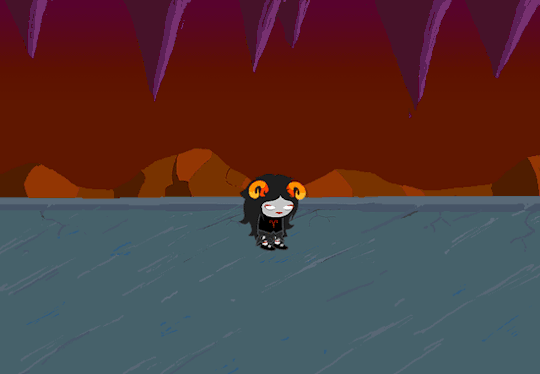
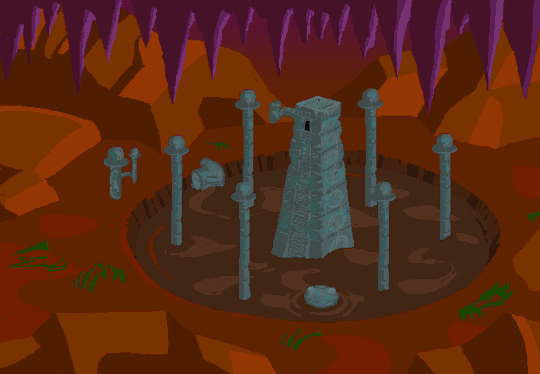
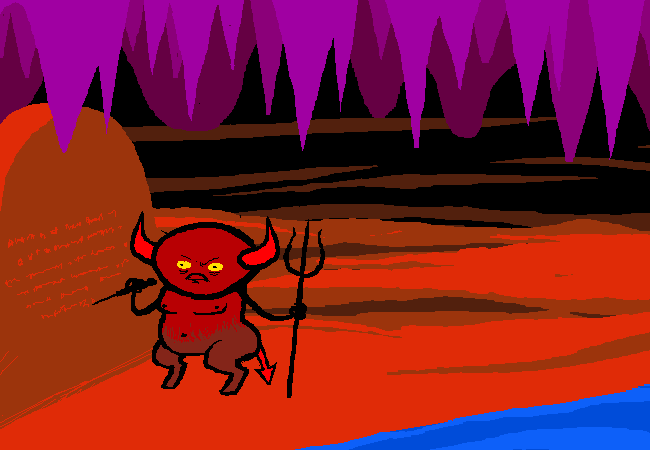
Aradia hears the ‘voices of the dead’ (p.2134), while Sollux heard the ‘psychic screams of the imminently deceased’ (p.2076), creating a sort of pathway between them. If Sollux hears a voice, they will soon get passed on to Aradia, like Death harvesting souls and handing them over to an afterlife for safekeeping. I don’t know if it’s intentional, but Aradia’s mystic ruins look very similar to Problem Sleuth’s depiction of Hell, both featuring purple stalactites hanging down into the panel over an orange-brown backdrop. It’s very striking and with no lusus and no home in a dangerous place like Alternia, surrounded by the dead with no sign of the living, it’s easy to imagine Aradia in some kind of metaphorical hell.
Aradia has lost interest in her former passions, and struggles to remember what emotions are like, asking Sollux ‘what d0es anger feel like’ (p.2085), and her days are mostly characterized by boredom, which could all be a representation of depression. Her introduction panel, a zoomed out shot of her in a flat, neutral expanse has the same emptiness. In writing, I think that giving a name to a character’s mental health condition – for example, Sollux having ‘debilitating bipolar mood swings’ (p.2076) is more of a minefield and carries a responsibility to accurately represent that named condition, which I’m not sure is happening with Sollux. But keeping it vague and unnamed gives more flexibility to represent something that might not be perfectly accurate to real life, but might still be relatable to some readers.
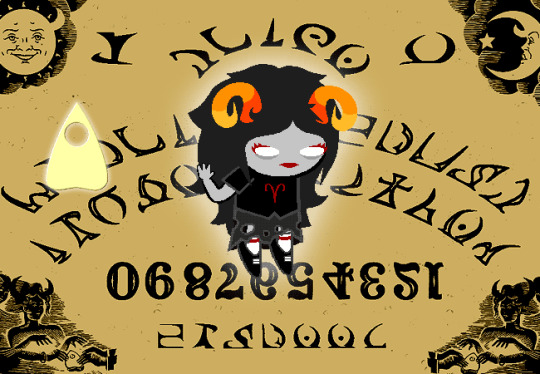
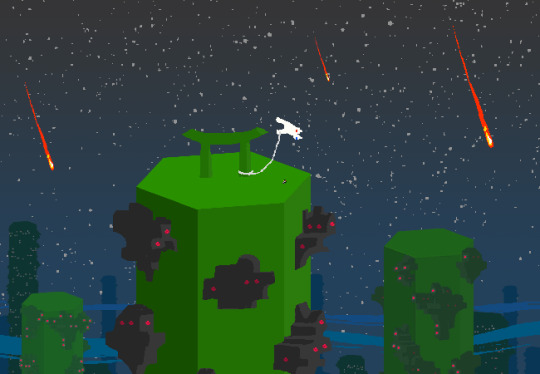
I am. Truly and deeply horrified. that Sollux has named his game SGRUB. These cleaning implements may not exist on Alternia but all I can think about is ‘Sgrub Daddy’ and a scouring sponge made in the shape of a grub. Also grubs are just the things that he programs games on? So it’s like naming a game Scartridge?? Act 5 is so canceled.
Aradia’s passivity about her existence and her decision to just wait things out extends to her fetch modus too, Ouija, a modus Jade owns but has never used. Page 2136 also provides a handy Alternian translator as it shows the whole alphabet (read right to left and top to bottom). Which may actually be the purpose of the page, now that I think about it.
But even though Aradia is spooky and possibly depressed, every character in this comic is a little big silly. And Aradia unearthing the Crosbytop on an archaeological dig and using it because of its ‘bizarre novelty’ (p.2138) is definitely her version of whimsy. Another example might be when she goes up to Sollux’s hive and uses her psychic powers to levitate his bicyclops and sit in its spot to message her friends even though there was an entire roof for her to choose from. Completely pointless use of powerful magic, very funny, no notes.
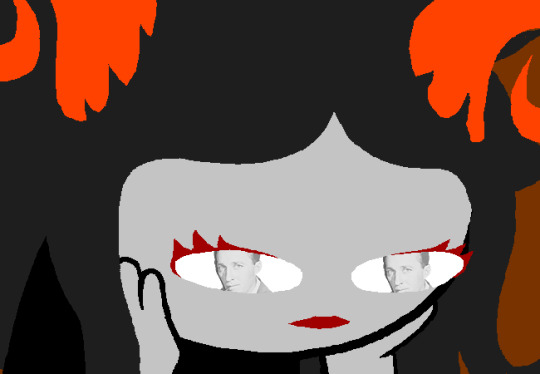

GA: I Thought Id Be Friendly Though GA: And Remind You That You Do In Fact Have A Hand In All The Terrible Things That Are About To Happen GA: Because Thats What Friends Are For (p.2139)
I’m really excited to see grimAuxiliatrix again here, and it’s fitting that she talks to Aradia right before the game begins, the two of them hanging out at their respective frog temples. Their attitudes are very different, though – AA feels nothing about her role in the end of the world as she knows it’s much bigger than her and totally beyond her control, which lets her absolve herself of responsibility. GA, on the other hand, seems to feel genuine remorse for what she’s about to do, to see herself and her friends as complicit in the apocalypse despite having no choice. Later, of course, GA will actively troll the kids while Aradia will refrain.
AA: and we twelve will behave simultane0usly as the pawns and the 0rchestrat0rs of the great und0ing (p.2085)
^ In this framework, Aradia is thinking more like a pawn while GA is thinking more like an orchestrator. Aradia is at the blue frog temple and part of the blue team, typically a cool and detached color, while GA is at the red frog temple and part of the red team, a warm and passionate color. Two teams and two outlooks, which will come together into one Incipisphere, and one apocalypse.
GA: Ill Be Here To Help GA: If You Need Me (p.2139)
In this chatlog GA perfectly lives up to her chumhandle – which, from a post I made six months ago means ‘serious, foreboding or gloomy, and Latin for a female assistant or helper’. She sure is acting foreboding while still offering to help! According to Karkat’s introduction, the Trollian chat client is a new beta release (p.1994), so these trolls just chose their handles recently. And while the initials are destined, the specific words they chose aren’t. GA could have stood for greenAnteater if she was scuffling for bugs in the sand or glowingAntidote if she was a potion seller making healing draughts or gallantAdventurer if she was secretly Jade’s pen pal, that’s all the same to Skaia. I know that the trolls’ first and last names were chosen by fans, and are full of mythological and astrological references, and I think the work they’ve put into picking these names is cool but I’m far more interested in the chumhandles because they’re how these trolls choose to represent themselves.

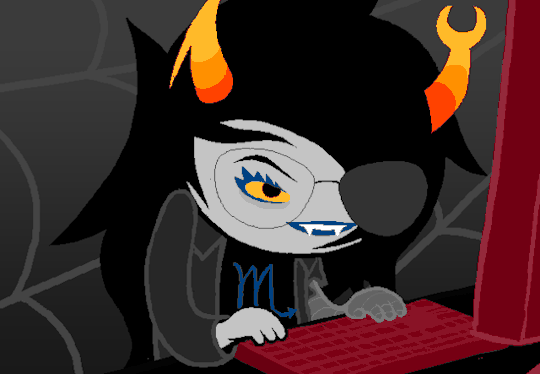
After a recap of Aradia’s earlier conversation with Sollux where she reveals that Sgrub won’t save the world after all, she talks to arachnidsGrip, wreathed in mysterious shadows and sat in front of a large spiderweb. Her pincerlike horn matches the one seen to the right of the screen in the meteor lab (p.1715), so ‘I guess we'll chalk another riddle up in the solved column’ (thank you eternally to Rose Lalonde for this evergreen quote).
Aradia and AG are having two different conversations throughout this chatlog. Aradia is responding to AG as though they’re having a mutual back and forth, while AG is charging ahead and either not reading Aradia’s messages or misinterpreting them to impose her own meaning. She knows how she wants this conversation to go, and will brute force it into going that way no matter what Aradia says.
Aradia’s introduction mentioned her involvement in a roleplaying accident, which also led to the death of her lusus, and this chatlog implies that AG was also involved. When we see her visually on the next page, she’s got a robotic arm, so her injury must have been the loss of one arm. Just a few pages ago, she was making fun of Tavros and Terezi for their disabilities (p.2122), while her disability might no longer be affecting her since she has this high quality prosthetic. So her insults are partly projection – she’s insecure about her own disability – but also shares a logic with people who are like ‘well I got an entry level job right out of high school and worked my way up the corporate ladder, so why are you still poor?’ It’s a mindset that ignores a lot of reality and individual difference, but makes sense coming from someone who struggles to see from others’ perspectives, and can’t see why not everyone would have access to their workarounds or even want them.
AG: 8ecause I have a present for you. It's a surprise, and it's going to 8e great. From me to you. […] AG: I can't wait to see the look on your face when you see. (p.2144)
I don’t know what this present is, but my guess is that AG wants to be the person to make Aradia actually feel something again. Whether that’s excitement from a great present or hurt from a terrible and offensive one, or maybe hedging her bets on either. Because right now Aradia doesn’t have any kind of look on her face! she’s bored all the time! And AG seems self centered enough to give gifts for purely selfish reasons and to want to be at the center of things, so, being the one to snap Aradia out of her depression would fit.
On a personal note, I love spiders, they’ve been one of my favorite animals since I was a kid. My Pathfinder character is a spider and she’s a cool as hell firework maker. If AG does spiders dirty and gives them an even worse name than they already have, I’m gonna have some shit to say.
#homestuck#reaction#ooc in tags#on the one hand im excited to give attention to all 12 trolls individually#including and especially the ones who have smaller long term roles in the story#on the other hand ‘character with a whole strain of discourse named after her’ is being dangled like a carrot in front of me#i cannot wait to read that old discourse i cannot WAIT to see it unfold firsthand#chrono
13 notes
·
View notes
Text
July 2, 2010
Homestuck Day 353
New Pages: 2139 - 2145
% Completion (Pages): 26.38
% Completion (Time): 17.44
4 notes
·
View notes
Text

first homestuck fic posted to fanfiction.net dropped a couple weeks ago
this is a one shot from the Peregrine Mendicant's point of view during and after [S] Descend, as she kills HB and rendezvouses with Jack to collect the package. feeling pretty good that the first fic posted is about my personal favorite character!
I thought the writer did a great job of getting inside her head, and as someone who likes it when Homestuck gets into darker and more serious emotions, the tone of this fic hit really good. The specifics of the battle and the characters' dialog - especially Jack's - weren't how I personally imagine them, but that's the best thing about fanfiction, seeing how other people interpret the source material differently. It would be less fun if the author's vision was exactly like mine.
definitely worth a read!!
#homestuck#wild#peregrine mendicant#also looking at the reviews it seems like this was the Actual first posted#not just due to deletions etc#although ofc people were writing fic on the forums before this#chrono
47 notes
·
View notes
Text
a few homestuck fan videos uploaded to youtube this week (june 2010)
Clubs Deuce's Homework by 5kypup - Original audio and art portraying Clubs Deuce as a child talking about his family, the Midnight Crew.
Terezi vs. the Sun by NightingaleRB - Audio from comedian Brian Regan and original art showing a headcanon about how Terezi became blind.
The Most Dangerous Game by NightingaleRB - Audio from comedian Brian Regan and original art showing a headcanon about how Tavros became disabled.
#homestuck#wild#idk that i want to endorse these second two as things to joke about necessarily#but they exist and a lot of people are enjoying them and sharing them at the time. so here#chrono
16 notes
·
View notes
Text
July 1, 2010
Homestuck Day 352
New Pages: 2132 - 2138
% Completion (Pages): 26.30
% Completion (Time): 17.40
Notes: Introduction of Aradia Megido
4 notes
·
View notes
Text
doing a silly cookie dance with my elf lusus
(page 2115-2131)
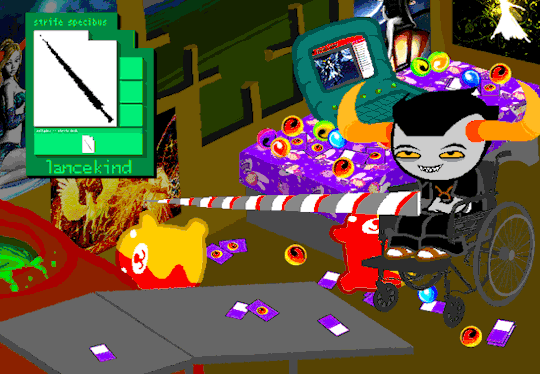
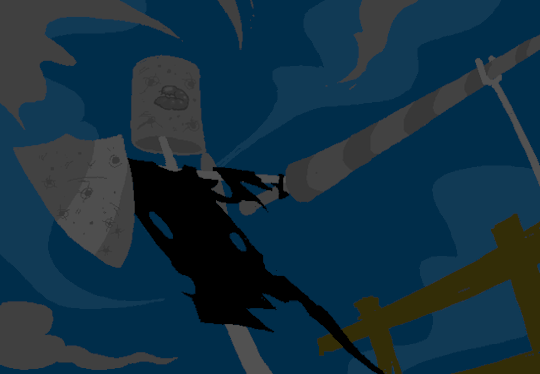
So far, three out of five trolls have a career goal they’re hoping to pursue when they’re older. Karkat hopes to join the Threshecutioners, Terezi plans to become a Legislacerator, while Tavros dreams of being a Cavalreaper. Gamzee doesn’t seem like the type to plan for his future too much, more like somebody who takes each day at it comes, but some sort of priest or whatever his cult’s equivalent is would make sense. Sollux, meanwhile, could have a great career in computers but doesn’t bother with future ambitions because he knows Alternia is just days away from being destroyed. So as well as being an excuse for some good wordplay and worldbuilding, these trolls dreaming of their futures is a harsh reminder that their session goes badly, and they won’t get to have these futures.
None of the beta kids ever mentioned future aspirations, so I wonder what careers might suit them somewhere down the line? If John went to school for computer science, he might become actually decent at computers and could go into programming? Or, he and Dave could probably both be lab scientists together with their enjoyment of slime and weird things in jars? Jade would be terrible at inventing if she didn’t have Skaia’s power to draw on but I could see her working with animals, maybe in dog training/grooming/care, or something else that involved being active and outdoors. Rose could be a lexicographer which I just now learned is the person who writes and edits the dictionary. If Earth hadn’t been totally destroyed, that is.
Tavros, like Gamzee, has dreams of a mythical ‘paradise planet’ (p.2012, 2117), and while Gamzee’s is home to Insane Clown Posse, Tavros’ features ‘a cruel villain with a MISSING ARM AND MISSING EYE’ which seems like an obvious nod to Jack Noir from the kids’ session, a cruel villain indeed. So the connection between Alternia and Earth is strengthening but I keep wondering why it only goes one way. Alternia has absorbed a lot of human culture without realizing what it is, seen in Act 5 and earlier in the Intermission with Spades Slick’s Crosbytop and Clubs Deuce’s Stretch Armstrong doll, but Jade in her visions of Skaia (and more recently Rose when she was communing with the elder gods) never learned anything about Alternia.
This is particularly strange because of Alternia’s ‘ongoing imperial conquest, besieging other star systems in the name of Alternian glory’ (p.2069). Alternia is colonizing other planets, so it should be them imposing their culture onto other societies. Here it’s the opposite, and it also doesn’t seem intentional, it seems more like some… tear in the fabric of spacetime that allows random cultural artifacts to bleed through. Like the tears in Lord English’s Cairo Overcoat (p.1253). Like the tears that could be produced if an indestructible time traveling demon is summoned upon the death of the universe to pick apart its corpse.
Anyway there’s a shitty joke about Earth containing ‘these weird aliens called "indians"’ (p.2117) which is made doubly shitty because, in the context of Peter Pan, this definitely refers to Native Americans. It’s a cheap racist joke that adds literally nothing to the story so doesn’t need to be here and is one of very few things I’d edit out of that story if I had that kind of power.

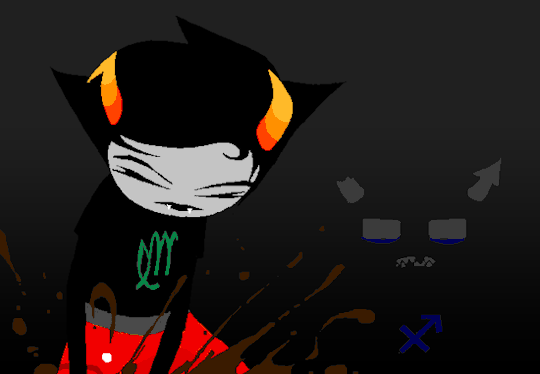
The story cuts to the trolls in the far future on the meteor lab, and confirms that arsenicCatnip makes it into Sburb and survives. Probably she and Jade were roleplaying together throughout Jade’s childhood playing a catgirl and a wolfgirl. And there’s the first glimpse of centaursTesticle, the dark blue Sagittarius troll, making everyone uncomfortable by standing around and watching. It’s excellent to see this act explore different gradations of sucking as a person, and the way different types of unpleasant people rub up against each other. Girl who thinks nothing of taking a chainsaw to her sleeping friend’s legs and feeling the blood explode over her still finds it offputting to be watched while doing it. Amazing.
Also GA going hog wild with this chainsaw attacking her friends – and it’s left highly ambiguous as to whether Tavros consented to this in advance – fits perfectly alongside Rose taking up dark magic and immediately blowing up her First Gate. They’re both so off the rails. I need them to talk again immediately.
Trollcount 6/30/10
Trolls officially introduced: Karkat Vantas, Gamzee Makara, Terezi Pyrope, Sollux Captor, Tavros Nitram Trolls seen visually and in Pesterlogs (not introduced): grimAuxiliatrix, arsenicCatnip, apocalypseArisen Trolls seen in Pesterlogs (no visuals): arachnidsGrip Trolls seen visually (no chatlogs): caligulasAquarium, centaursTesticle Trolls yet to appear: cuttlefishCuller ← confirmed most mysterious troll?!
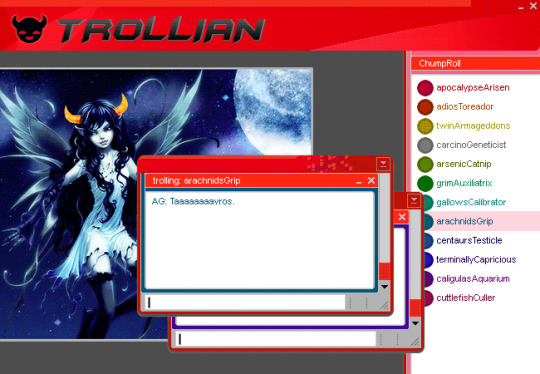
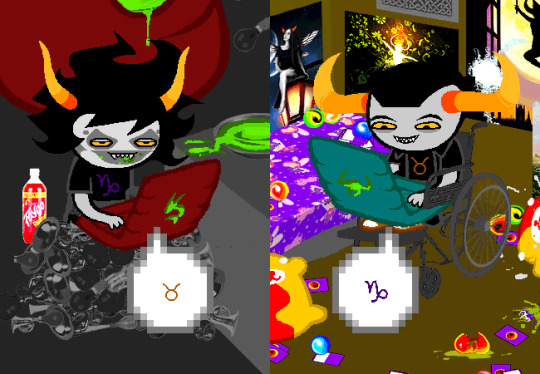
Commands for the last few troll chatlogs have told a character to ‘deal with’ another, such as ‘Tavros: Deal with AG’ (p.2122), a syntax that was never used with the kids. John, Rose, Dave and Jade love each other so much and actively want to talk to each other, but the trolls are suffering through a lot of their interactions and feel like they have no choice. And with this chatlog in particular I understand it – in their very first appearance, arachnidsGrip escalates quickly from some normal gamer trash talking into making fun of Tavros and his teammates for their disabilities. So, not making the best first impression. Although their typing quirk, replacing the letter ‘B’ and ‘ate’ sounds with the number 8, and using eight question marks, eyes on emojis, and stretched out letters for emphasis, is one of the more fun ones to me.
Something about AG’s syntax (and text color!) reminds me of someone slightly older, who’s not really in touch with their group’s slang and typing styles and is basically operating from a different word bank. ‘Who told you to do something so fraudulent?’ (p.2122) coming from a 13 year old is really something. And the fixation on certain words like ‘fake’ and ‘meddling’ gives me this vibe too although maybe I’m thinking of specific people I’ve known, I’m not sure. AG also makes their opinions on people VERY clear, like telling Tavros he’s boring (even though they messaged him first!) and talking about GA like she’s an annoyance. But they seem like they’re secretly actually more concerned with what others think of them, like how they’re flattered that GA apparently wants to talk to them so much – something they could be exaggerating in an effort to impress Tavros.
AG also describes Tavros as ‘f8ed for a team of losers’ – fate and destiny are important concepts in Homestuck so this wording probably isn’t accidental, and I’m interested to meet AG to find out what exactly their connection to fate is.
AT: mAYBE WE CAN SLAM ABOUT IT, TC: YeAh, I cOuLd KiCk ThE sHiT oUt Of SoMe RhYmEs BrO. (p.2123)
Tavros’ conversation with AG is immediately followed by one with Gamzee, and they are unimaginably different. Tavros and Gamzee are the first pair who seem to genuinely enjoy each other’s company and just be having fun together. Despite their different interests, they’re supporting each other’s slam poetry skills! I don’t love either of them as individuals, but somehow when they pair up I’d be happy to read so much more of them – Hussie is an absolute coward for saying that the two ‘proceed to have one of the worst rap-offs in the history of paradox space’ and not letting me read it. I bet it kicks ass. Tavros referring to his own ‘pERSONAL MOTIFS,’ is also extremely good to me. This guy has gotta be out here analyzing Pupa Pan for its themes and motifs too. I will give him more media literacy points than Karkat.
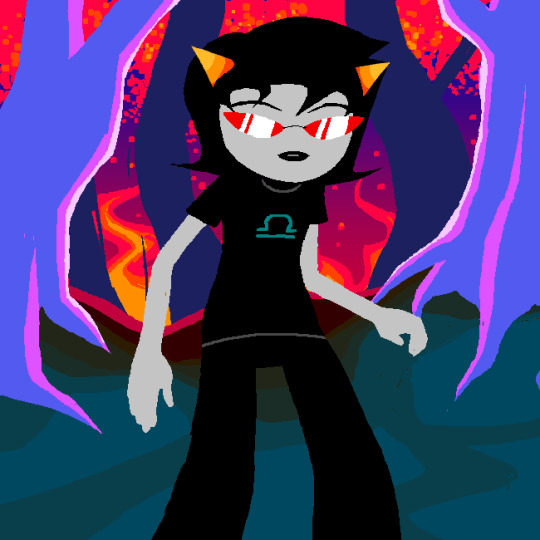
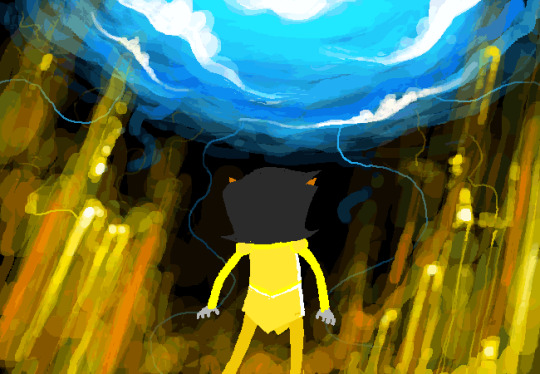
Then, there’s a speedrun of Terezi’s relationship with her young dragon lusus, including her species of dragon, communicating with Terezi in her sleep and inspiring her to wake up on Prospit, hatching, quick death and sprite prototyping, told at the point right before she enters the Medium. The burning woods imagery and egg hatching imagery have both shown up in Homestuck before, with Rose and Dave respectively, but they’re combined for Terezi’s entry. I don’t know that this has a greater meaning, but I think most creators have certain symbols that intrigue them that show up in their work over and over again, and these are some of Hussie’s.
The two panels above are gorgeous to me. Those colors make me with Homestuck was a scratch and sniff book because I bet they smell so good. The blurred Prospit on the right also represents how Terezi actually experiences the world, unlike all her other panels which show how the player sees her world, and I wish more Terezi panels were drawn in this impressionist style to better reflect what this is like for her.
In case it wasn't clear, dragons are real. (p.2126) AG: Like a made up friend, the way fairies are. (p.2122) CG: YOU LOOK LIKE AN ELF. [...] CG: YOU LOOK LIKE YOU SHOULD BE BLOWING INTO A FUNNY LITTLE SHELL, AND LIMBERING UP FOR A SILLY COOKIE DANCE. EB: do you even have elves? CG: YES, LET'S COMPARE WHICH FANTASY CREATURES THAT DON'T EXIST WE BOTH DO OR DON'T NOT HAVE. (p.1907)
^ I think John was onto something here actually. This could have been a really interesting conversation. Elves and fairies are both part of folklore on Earth and Alternia, but don’t exist on either. Dragons are part of Earth folklore, and exist for real on Alternia. Insane Clown Posse exist for real on Earth, and are part of Alternian folklore. And actually Karkat is pretty close minded I think, so maybe elves do exist and he just doesn’t realize. I asked my good friend who is super into astrology which star sign they’d associate with Karkat’s elf description here (which is more ‘Christmas elf’ than ‘D&D elf’), and they said Sagittarius or Aries which are apparently ‘full of energy, can be silly and funny and spontaneous, goofy, life of the party’ so my new headcanon is that AA or CT has an elf lusus.
Elsewhere in paradox space, we examine another planet, forgotten by time. (p.1989) He thinks that if you think that we have time to drag out every little gag and expected pattern along the way, you've got another thing [sic] coming (p.1993) We return to the Land of Pulse and Haze, so that we can rewind a bit. Before all that paint got slopped on your hive (p.2068) We also agree that while that would have been pretty sweet, we are also in kind of a hurry here. (p.2070) But Sollux, even with his vision twofold, does not have the perceptional luxuries of our vision omnipresent. (p.2092) We already knew this. But of course, you didn't. (p.2129)
The ‘we’ pronoun was very rare in the narrative text of Acts 1-4, but keeps showing up in Act 5, giving the feeling that the player and narrator are working together to tell this story – something that’s been literally true since the start, given the high level of reader input in Homestuck. So in some of these examples, the ‘you’ is doing double duty, referring to the character when it’s used directly, and to the player when it’s implied in the ‘we’, conflating those two entities. And in other examples, the character is referred to in third person to put distance between them and the player. This playfulness with language is one of my favorite things about Homestuck and every time, it feels like the player is getting promoted. In the early acts they knew very little about Sburb or about the timeline’s future, and discovered most things at the same time the characters did. In Act 5 the player knows way more than the trolls do, so the narrator is taking them aside so they can whisper secrets in each other’s ears. Imagine if you were playing a video game for the second time and instead of getting the popup that says ‘Press B to jump’ the first time you need to make a jump, the popup said ‘I see you already bouncing around the screen there. We know how these controls work ;)’ cause that’s what it feels like.
Also I’m still pretty sad about Terezi’s lusus dying even though I knew it was going to happen (and even though she’s resurrected immediately as a sprite). To spend countless years in an egg only sensing the world outside and then to immediately die after finally taking flight is a rough break. With the other lusus deaths we’ve seen I’ve been sad for the troll, but with this one I’m sad for the lusus herself too.

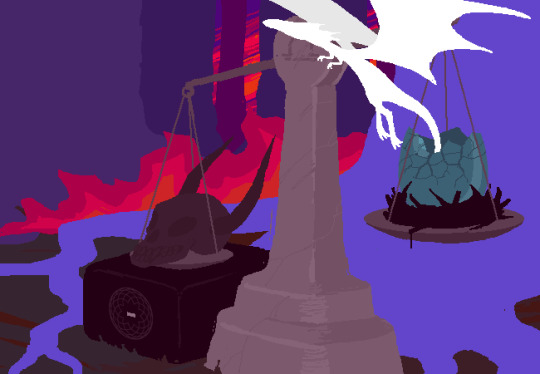
At the time, it wouldn't occur to you to wonder whether the device was directly responsible for the apocalypse, or merely served as its precisely calibrated harbinger. And it certainly wouldn't occur to you to cast doubt on any perceived difference between those two things. (p.2131)
okay!!!! talk about an update that saves its best line for the final page. Terezi grows up near a set of doomsday scales engraved with her shirt symbol, which also explains her obsession with murder and justice pretty well, not to mention her chumhandle. Its counterweights are a dragon’s egg, something which represents life, beginnings and the future, and the skull of an ancient mother grub, something which represents death, endings and the past. However, the mother grub is the creature who once gave life to hundreds of thousands of larval trolls on Alternia, while the dragon exists for minutes at most, dying near-immediately after hatching and reversing the meaning of these weights – just like how the doomsday device that ticks down to the destruction of Alternia was installed there by the only entity that can possibly save the trolls.
I think the line above is the clearest explanation of Sburb and Skaia that I’ve seen yet. After exploring the Skaianet lab near her house, Rose determined that activating the cruxtruder is ‘not directly responsible for summoning a meteor’ to the player’s house but just reveals the countdown as a warning to the player (p.880). Act 4 then reveals that the meteors come from the Sburb session and are sent to Earth during its Reckoning, with Skaia choosing very precisely when and where to send them, sacrificing Earth to defend itself. Skaia knows exactly when each player will activate their cruxtruder, and it knows how long it will take them to figure out the game’s tutorial level. It decides whether they successfully make it to the Medium. The doomsday device counts down to the end of the world and causes it directly because the same entity controls both things.
I swear every day I get more and more ready to join Derse and blow up Skaia like RIGHT now. Alternia sucks enough already, these kids already have to worry about being culled for totally arbitrary reasons, and now Terezi has to grow up watching this doomsday device in her back yard and being careful not to tip it because she doesn’t want to cause the end of the world? What could Skaia POSSIBLY have to offer that’s worth all this?? Like if I as a reader am supposed to be on Skaia's side and support the kids and trolls trying to win this game there better be one hell of a reveal still to come. It's either that or a cathartic 'Rose was right' arc where everyone takes up dark magic and the kids fully team up with Jack. I love this story maybe more than any other piece of media and I don't think it's close to wrapping up but I do struggle to imagine how it could possibly end.
#homestuck#reaction#i know its troll act but i am slamming that ‘TALK ABOUT THE BETA KIDS’ button just whenever i can <3#sometimes a post just has to go 10 different places. and its literally not my fault bc the update did it first#i did love this series of pages a lot tho we got new troll! besties! time jumps! colors! dragons! doom! all my favorite things!#chrono
8 notes
·
View notes
Text
June 30, 2010
Homestuck Day 351
New Pages: 2124 - 2131
% Completion (Pages): 26.21
% Completion (Time): 17.36
6 notes
·
View notes
Text
June 18-21 2025 2010
Gonna backtrack a day because I forgot about this line and I feel it necessary to keep.
It's just that your red chalk is THE MOST DELICIOUS CHALK. You cannot get enough of it. Anyone who says there is a more delicious chalk out there simply reeks of deceit.
Now Terezi has beef with AR and WV.
Anyway, we keep on with Terezi who is on a mission to recruit members for the red team as shes currently the leader unless Kar gets his way. We get to see her interacting with AC whos symbol is the one for Leo. They go for a little more than half of the log role-playing as a dragon and feline respectively when Terezi asks if AC wants to join the team. AC thinks playing sounds fun but need to ask someones permission to avoid some sort of argument. Whoever they are is probably not AC's custodian as 'H3S NOT TH3 BOSS OF YOU' and 'H3 LlV3S NOWH3R3 N34R YOU' unless its like Gam's situation. Either way AC agrees with Terezi but will have to get back to her later.
We skip the convo with Gamzee to avoid rehashing and face Terezi's worst nightmare: Karkat trolling her.
Karkat comes off a lot like a whiny brat; the kind where its their way or no way down to his beliefs on how Terezi actually feels about the title change. Actually nah, at best he opperates on first grader logic. Ya know, that age where they start understanding consequences and rules and they try to "gotcha" about how smart they are? Only to be knocked down by your own better understanding of rules and loopholes then turn around and act like they knew all along and were just testing you. .... Look all my cousins on my ma's side are younger than me, Ive done this song and dance for years.
All that aside, the way Terezi handles the situation works really well. Karkat only wants to play this game because that puts him into a higher level of authority than his peers which is supposedly his god given right. In this conversation we see that Terezi has a better understanding of the game and how it works and paints it in a way that benefits Karkat.
GC: OK TH3 THING YOU N33D TO KNOW 1S TH3 L34D3R ST4RTS OUT BY RUNN1NG THE CL13NT 4PPL1C4T1ON
GC: WH1L3 1 TH3 LOWLY S3COND OFF1C3R CONN3CTS TO YOU W1TH TH3 S3RV3R WH1L3 1 R3M41N G3N3R4LLY 1N 4W3 OF YOUR M4NLY GR4ND3UR
GC: 4ND 1 S1T 4T MY COMPUT3R DOlNG M3N14L CHOR3S IN SUPPORT OF YOUR H3RO1C 3SC4P4D3S WHICH HON3STLY 1 DONT TH1NK YOUR3 R34DY FOR BUT WH4T3V3R
We smash cut to the future where Karkats hive has been graffitied with a multitude of colors and the plumbings been mangled. From their convo we learn Karkat has done zero research om this game because of his disdain for AA and his superiority complex which leaves him as the most uninformed player for the session. He technically got his wish, hes 'leading' the entry but not actually able to do any of the sort of commanding roles he though hed get. Its actually really funny since later he becomes Johns greatest source of information when he starts off blinder than Terezi.
His land is OF PULSE AND HAZE with the title KNIGHT OF BLOOD. Kind of ironic since troll blood colors are very important in the society but he obfuscates and dodges Terezi's question about his. I like the connection with his land though, pulse and blood, and I wonder what his quest involves.
We then see a few other trolls. One with rams horns, the symbol for Aries in red and pure white eyes with power to decapitate the frog temple statue. Perhaps AA if the connection with ruins is anything to go by. Another we only get glimpses of whose found Gamzee's Faygo. They have blue and black striped pants, gold rings with purple gems one of which has the symbol for Aquarius and refers to LAND DWELLERS. A sea dweller perhaps?
With that tease out of the way, we return to Kar in the past as he descends to the lower level of his hive.
You go downstairs and confront your custodian, which is another term for a frightening beast known as a LUSUS NATURAE.
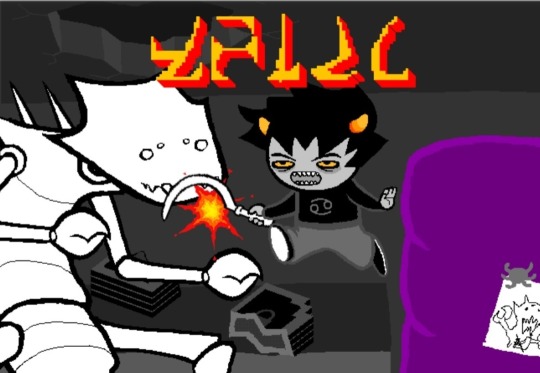
Theres a nice little info dump on Trolls that I shall place here for later review.
Adult trolls supply their genetic material to the FILIAL PAILS carried by mperial drones and offered to the monstrous MOTHER GRUB deep underground in the brooding caverns.
The mother grub then mixes the material, how?, and lays thousands of eggs wherein larva hatch and pupate.
[...] the young troll with his or her newfound limbs undergoes a series of dangerous trials. If they survive, they are chosen by member of the diverse and terrifying subterranean monster population native to Alternia.
Trolls and their custodians have a peculiar arrangement of codependence. The lusus behaves as a lifelong bodyguard, caretaker, and visceral sort of mentor, while the young troll must learn to function as a sort of zookeeper.
The vast majority of adult trolls are off- planet, serving some role in the forces of ongoing imperial conquest, besieging other star systems in the name of Alternian glory.
Riveting lore, I love it.
Karkats lusus is very crab like in nature but with an insectoid sort of shape to make a more upright creature with claws. Adorably, on the fridge is a drawing of Kars lusus that mirrors Johns own drawing kept in place with a crab magnet.
#reblog#the absolute shade you are throwing at karkat here is SO funny#i too wanna learn more abt karkat's land and his quest! he doesn't seem like the type to actually complete his quest so what happened??#and yeah the drawing on the fridge.... kk acts like a big time hotshot but really he's just out here doodling his dad#rly nice of you to mentor your cousin and teach him more abt the adult world! i wish i'd had a cool older cousin like you#but sadly i am the oldest cousin. i hope yours is having a good time at your place!#chrono
11 notes
·
View notes
Note
is it possible that grimAuxiliatrix lives in whats meant to be the derse sculpture for the red frog ruins?
so looking at the different frog temples again, I don't think this is literally true, but I WISH it was true because I think this would be so cool
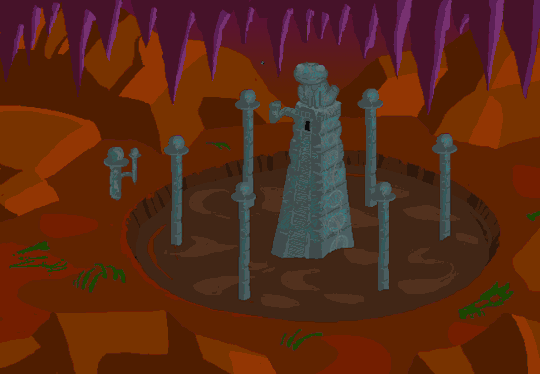
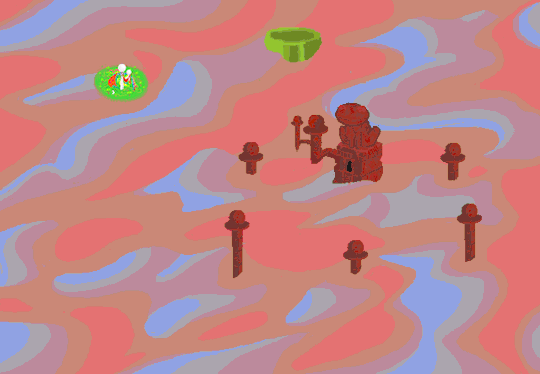
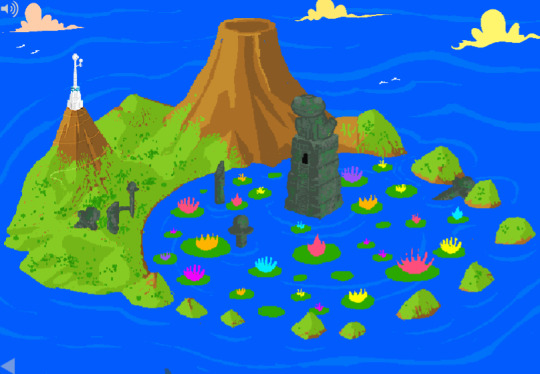
here's the three frog temples next to each other shortly before the sessions begin. grimAuxiliatrix's and Jade's actually have more in common - both of them have what looks like the top of a volcano positioned behind them, although GA's is mostly buried in sand while GA's is mostly surrounded by water, and both have the Prospit/Derse shaped hive to the left of that on top of a smaller plateau, with GA's again covered in sand. uncertain if there's more of GA's hive below the sand level or if she had to build on top of it.
most of the planets around Jade's frog temple are broken, which is a seriously bad omen for the kids' session. The Derse temple is positioned a ways in front of her house though, and in AA's frog temple (left) it's much closer to the ruins than GA's hive is to hers. Blue frog doesn't appear to have a hive or volcano near it, though they could be intentionally hidden by the purple stalactites.
but I LOVE the idea of GA living in the Derse sculpture because of the contrast that would set up between the trolls' and kids' sessions. The kids are balanced in theory, with two players on Prospit and two on Derse, but it's a Prospit player (Jade) who first learns about the game and convinces her friends to play it, and a Prospit player (John) who's first to enter the Medium. So the kids' session feels like it's led by Prospit, as though it's the planet that charges ahead while Derse cautiously stays behind. Which is in direct contrast to how the planets act in their war on Skaia - the White King and Queen are cautious and always playing defense, while the Black King and Queen are supposed to be the ones to win and implement the Reckoning, and Jack especially is ready to take action and plow down anything in his way.
so if the kids' session is Prospit led, I think the trolls' being Derse led would be interesting. and there's different ways that could manifest. apocalypseArisen being a Derse player and being the one to learn about the game and share it with the trolls is one way, only eleven of the trolls getting into the session (six waking on Derse and five on Prospit) could be another, and GA literally living in the Derse sculpture attached to her frog temple could be another still. to be honest it actually IS possible that she used the orbs that were once part of the Derse sculpture to build her hive, especially if orbs aren't typically used for building on Alternia and she had to source them from somewhere.
and if Prospit and Derse societies kind of do the opposite of what the players do, it would make sense that a Derse led game has a better chance of success. because they'll have a Prospit that immediately forges ahead in response to the players' heavy Derse presence, and a Derse that has to play defense in response, or one that maybe gets a little too confident because they feel they have the advantage based on their players. which could tie into Karkat and co being able to successfully exile the Black Queen earlier in their game, as she possibly thought that 'conceding ground can supply the only remaining advantage' the same way the White Queen did in the kids' session (p.1618).
so a Derse-led session leads to a Prospit advantage on the battlefield and therefore an easier chance of the players defeating the Black King in time to avert the Reckoning, as the trolls apparently did. that, plus the fact that their society literally prepares them for Sburb since infancy, means the trolls' session was set up for the absolute highest chances of success. and yet, they still failed. no wonder they're mad.
#asks#'what decides whether a player dreams on Prospit or Derse' is one of my biggest questions tbh#i feel like there's zero hints towards it so far#except for MAYBE the pairs of dreamers being siblings in the kids' session#but the trolls are all the exact same amount of related according to my understanding of the mother grub#so thats something id love more information on!#maybe that would help in determining if GA has anything to do with derse also#chrono
13 notes
·
View notes
Text
musicless behavior
(page 2100-2114; thoughts on Alternian art?)
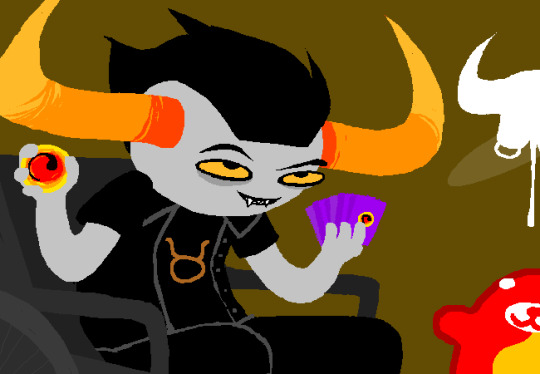

hey check it out there’s a new troll! Or possibly an old troll because Tavros has been talking to the kids for a thousand pages, but now he has a name! grimAuxiliatrix has been paired with Tavros since their first Pesterlogs (p.1093, 1099) with their pages usually appearing one after the other, and that’s still true here where ‘Stop being the other girl’ [GA] cuts straight to Tavros. I’m definitely expecting him to be on the red team because of this, and possibly they have another connection as well.
Tavros’ room is a total mess, like all the trolls except for Karkat. This is another parallel between John and Karkat, as the only group member to actually tidy their rooms, and is almost surprising that Karkat’s not constantly throwing things in anger. Does he stress clean? is that why he got somad when Terezi started slapping paint on his house? I’m gonna headcanon that because it’s compelling to me.
You used to engage in various forms of MORE EXTREME ROLEPLAYING with some of your other friends before you had an accident. (p.2031) You used to engage in various forms of MORE EXTREME ROLEPLAYING with some of your other friends before you had an accident. (p.2101)
These lines from Terezi and Tavros’ introduction pages are identical, so, it seems like they were roleplaying together and were part of the same accident, something bad enough to leave Terezi blind and Tavros in a wheelchair. The line mentions friends plural, so I wonder which other trolls were involved. arsenicCatnip enjoys chat roleplaying, so could be a candidate, though it’s also possible that the roleplayers are the group Terezi doesn’t want to play with anymore – her ‘Hmm, no not her. Nope, not her either. DEFINITELY not that guy’ (p.2054). It is also no longer shocking that extreme roleplaying could lead to disabilities, given how intense non-extreme roleplaying already is for both Tavros and Terezi.
For Tavros, being in a wheelchair seems to have a significant impact on his ability to do things day to day – he struggles to get in and out of his recuperacoon, and while he has a ramp, he doesn’t have a way to lock his device into place meaning that it often falls down while he sleeps. Changing clothes also takes him a long time. His big horns aren’t linked to his disability, but they’re also a source of struggle for him. It’s not all that surprising that accessibility aids aren’t big on Alternia, but it’s a contrast to Terezi’s blindness, a disability that doesn’t seem to impact her daily functioning at all. In a different story, a contrast like that could make for interesting commentary. I don’t think Homestuck will be the place for that, both because Hussie isn’t exactly known for being disability positive in their older work, and because the nature of Sburb and alchemy will let Tavros produce the mobility aids he needs pretty quickly.
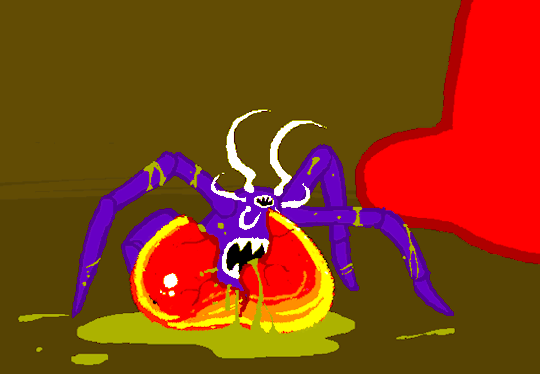
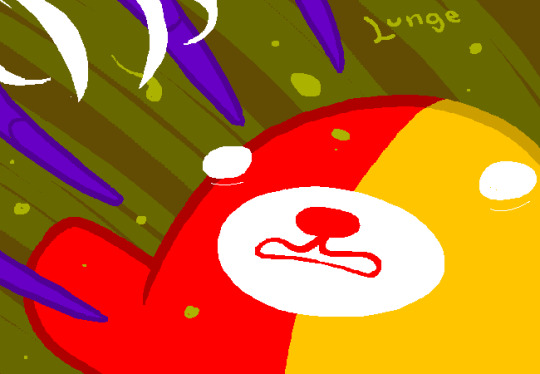
Fiduspawn is gnarly as all hell, and potentially dangerous too. Instead of being plastic toys or big marbles like I assumed at first, the orbs scattered on Tavros’ floor are eggs filled with slime, which must totally mess with Tavros’ four wheel device if he ever runs over one accidentally. Which he probably does because they are all over the floor. Along with the slime, they hatch into weird giant bugs, which attach themselves like a parasite to a plush toy that does not enjoy this process, impregnate it, and slither away. Then a second, even weirder creature bursts forth from that plush and destroys it, then goes over and eats the bug that fathered them(?) who may or may not already be dead(?) This is actually not more violent and gross than kids’ cartoons on Earth but there is definitely a more challenging cleanup process.
The story has made it clear that Alternian society has long been preparing for Sburb by teaching its kids architecture, but, has it also been preparing them by making games that have an impact on reality? Fiduspawn birthing monsters in a child’s hive for them to deal with – when most kids probably don’t have Tavros’ animal communion powers – is preparing kids to have their homes invaded by imps. And extreme roleplaying is probably teaching them to explore the land and work as a team to solve puzzles and fight monsters, just as they’ll do once they’ve passed through their first gates.
Tavros’ Fiduspawn game and Terezi’s courtblock LARP are written very similarly, and both are a substitute for their former extreme roleplaying. In both cases, the narrative really leans into the kids’ games, acting as though the creatures and plushies involved are reacting like a person would – very different from the more detached narrative of much of Act 5. Terezi’s roleplay ends with the shocking moment of her hanging Senator Lemonsnout and leaving him to dangle from a noose along with his fellows, while Tavros’ ends differently, with his putting Horsaroni and his lusus Tinkerbull peacefully to sleep. Though, it might not be as big of a contrast, as Tavros’ game also leads to a plushie being mercilessly destroyed. Even for someone who might want to play a gentler and less violent game, those don’t seem to exist on Alternia.
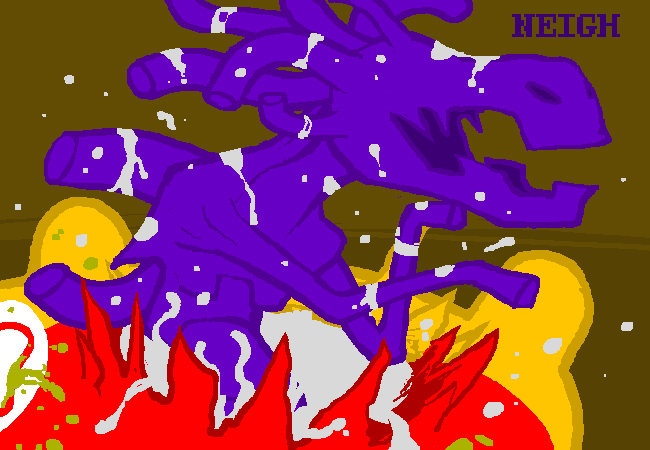
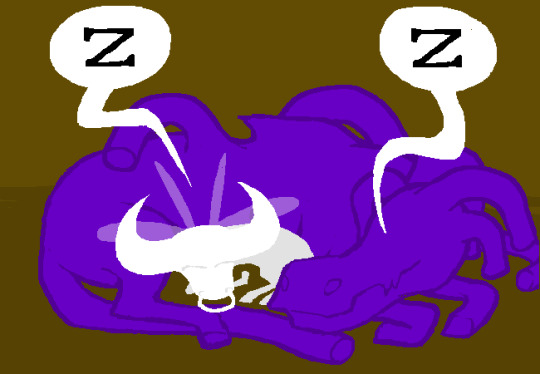
Tavros’ ability to put animals to sleep is similar to Sollux’s, whose psychic powers put all the bees in his hive to sleep (p.2080). Tavros, however, struggles to sleep himself because his horns don’t fit inside his recuperacoon. Tavros also told Jade that the only time he had any fun playing Sburb was while awake on Prospit (p.1936). So, was playing Sburb the first time Tavros was able to get a good night’s sleep, and was that part of why he was so happy there? And surely sleep being a big focus of the story all of a sudden – the trolls’ sleep powers, Karkat and Tavros both getting into their recuperacoons in the middle of the day, Gamzee eating the sopor slime he’s supposed to sleep in – is linked to the role of sleep as a Sburb mechanic? All these trolls already having strange relationships with sleep probably primes them to wake up in a magical kingdom and carry out game functions there.
I will say, it makes me a little sad that Tavros is already into Alternian slam poetry. I sort of assumed that rap either didn’t exist on Alternia or at least that Tavros knew nothing about it. It was just funny for me to imagine that Tavros was rapping for the first time when trolling Dave (p.1595), and had even learned the form from some of Dave’s own raps, which would explain why Tavros’ were also terrible.
As I understand it, slam poetry is spoken word (no music), while rap is set to music, so that’s a difference between the forms. Music not existing on Alternia would be very thematically interesting to me as it’s the interest that all four kids share, it’s important to their quests within Sburb (John’s denizen’s palace looking like a giant organ, Rose learning to ‘play the rain’, the giant record on Dave’s land), plus the musical accompaniments to most of Act 1-4’s big dramatic moments. But there hasn’t been a [S] page in Act 5 yet, and during Karkat’s Strife, AH supplied external music and told the reader to imagine this animation instead (p.2070). That being because this harsh, brutal, lonely society never got around to inventing music because it serves no purpose to them would be both very sad, and very believable.
Alternia has lots of other art, though, including movies, TV shows, video games, visual art (the fairies on Tavros’ walls), and whatever Pupa Pan is (theater production??) I’ve been thinking about the fact that ‘the vast majority of adult trolls are off-planet’ (p.2069) and wondering about the small minority of adult trolls who stay on Alternia. Could that be the creator class? Kids and teenagers are incredible at making art, but large scale organization and budgeting are difficult skills to learn for people of any age and I feel like blockbuster movies and long running TV shows need some serious infrastructure behind them, not to mention years of work. I believe that teenagers are capable of learning to do all this, but having the time to learn these skills, then make multiple seasons of a TV show, then share those skills with the next generation, before they hit ~9 solar sweeps and have to leave the planet? Stretching believability in this otherwise 100% realistic story.
So I’m choosing to believe that the troll actors and directors and producers are the adults who stay on the planet and, I suppose, create the media that will influence the next generation of kids. The Thresh Prince of Bel-Air, for example, is Alternian propaganda trying to convince kids to become threshecutioners, something that’s totally worked on Karkat as it’s his dream job, and is just like how the American military funds first person shooter games. And at least one of the trolls yet to be introduced will be hoping to enter this media industry when they grow up. Possibly grimAuxiliatrix as she clearly has an eye for design. Or possibly arsenicCatnip, as her interest in roleplay could definitely translate to storytelling.
#homestuck#reaction#a day late but i straight up crashed from exhaustion yesterday#i am not kidding when i say i needed coffee just to have the energy to hold my switch#and now its another busy week + a billion degrees today in a place that’s never heard of air conditioning#more soon. sure am curious abt the new troll who showed up in pesterlogs yesterday!#chrono
17 notes
·
View notes
Text
June 29, 2010
Homestuck Day 350
New Pages: 2115 - 2123
% Completion (Pages): 26.11
% Completion (Time): 17.32
4 notes
·
View notes
Text
[EOA4] Trolling at the End of the World
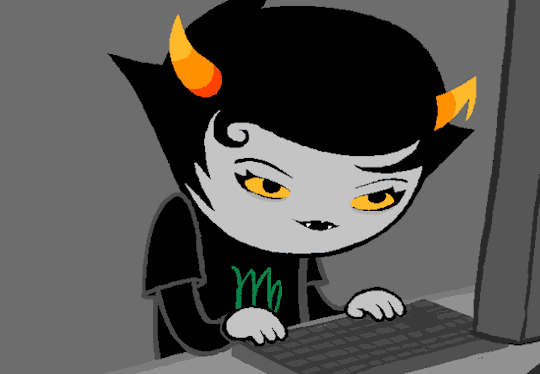
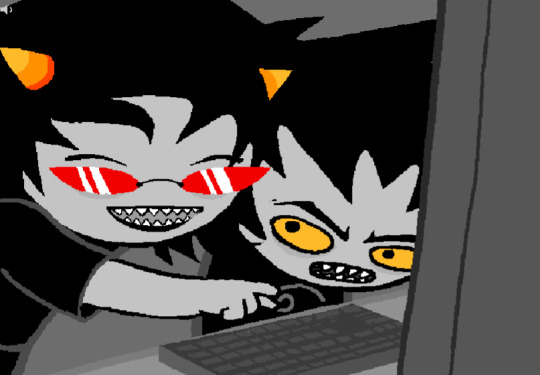
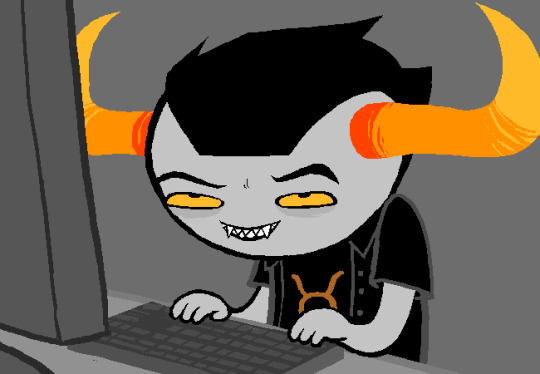
TG: i guess im saying be a less shitty troll (p.1589)
Acts 3 and 4 of Homestuck feature a new group of characters, known as ‘the trolls’. carcinoGeneticist, grimAuxiliatrix, gallowsCalibrator, twinArmageddons, and seven others yet unseen, are presented as Internet trolls in their actions and mythological trolls in their appearance. Almost immediately, they’ve captured the interest of fans. Forum posts and Formspring questions reveal endless curiosity about the trolls’ own Sburb session, how they learned about the kids’ session, their connection to the Western zodiac, and more. Their Pesterlogs with the kids average almost three times as long as the kids’ Pesterlogs with each other, and are packed full of exposition, characterization, and antagonism slowly shifting towards friendship.
At the end of Act 4, I set out to close read the trolls’ chatlogs in the context of Internet trolling as a phenomenon, aiming to ask whether the Homestuck trolls’ strategies and intentions reflect those of actual Internet trolls, and whether they achieve their intended outcomes. In other words, are they good at what they do? I quickly realized that the answer to this depends on an entirely different question, one that can’t yet be answered for definite: are the trolls telling the truth?
In this essay I talk about the typical behavior of a 2000s Internet troll, then examine the trolling strategies of each troll who’s interacted with the kids so far. I discuss how well the Homestuck trolls fit the profile of real Internet trolls if they’re being honest with the kids vs if they’re lying, and what this would mean for the story in each case.
[about 8000 words | ao3 mirror | troll pesterlog index | further reading]
Contains spoilers for Homestuck page 1-1988; does not contain any spoilers or information from beyond this point.
By the summer of 2010, Twitter has 40 million active users, while Facebook is approaching 500 million. The Internet is no longer viewed as a social space only for geeks, nerds and people who struggle to make friends in ‘real life’ – it’s becoming an extension of face to face communication, and it’s common practice for young people to share their photographs, life experiences and relationship developments on social media. As a result, terminology once limited to online spaces is receiving mainstream attention. Among this is the ‘troll’, a term which originated on Usenet in the late 1980s and early 1990s, but which many new social media users are encountering for the first time. 2010 sees a British man jailed for eighteen weeks on charges of Internet trolling, bringing the term to courtrooms. Opinion articles in the New York Times as well as major news outlets in the US, UK and Australia report on trolls. A small number of Internet users claim to make hundreds of dollars each month as ‘trolls for hire’. Several academics are beginning to conduct the first major studies on trolling.
It’s in this context that Homestuck begins to introduce its own colorful crowd of trolls. Readers fairly new to the Internet probably know what a troll is and how a double meaning between mythological bridge trolls and real online trolls applies to these characters, while readers who are Internet veterans have almost certainly witnessed trolling, and many will have acted as trolls themselves. However, with information coming from so many possible sources – personal experience, forum culture, new social media, mainstream news outlets, etc – readers probably aren’t all working with the same definition of a ‘troll’, even while they share the broad concept. Research on trolling often begins by describing this uncertainty in how the term is applied, before coming to a working definition for its own analysis.
2010s literature on trolling mostly involves observing trolls ‘in the wild’ on platforms including Usenet, 4chan, Reddit, Facebook, Tumblr, classified ads and newspaper comment threads, analyzing the trolls’ behavior and/or other users’ reactions to it. Some research includes interviews with self-reported trolls or Internet users familiar with trolling. Later research often discusses a shift in trolling culture throughout the 2010s as the ‘real’ and online worlds become increasingly intertwined, as social media links users’ online and offline identities to a greater extent, and as aspects of life such as political campaigning and job applications gain an online dimension. This later research tends more pessimistic, linking a culture of trolling with a rise in reactionary politics. While such research is important in many ways, earlier analyses which focus on the 2000s and even 1990s trolling culture are more relevant for discussing Homestuck, as this is the culture Andrew Hussie is drawing from when creating these characters.
Consequently, I’ve identified a list of features common to trolls operating in the 1990s and 2000s. Trolling manifests differently on every site and even between subcommunities on the same site, so these traits aren’t universal, and any individual troll might strongly embody some of these while disregarding others – Homestuck itself draws attention to the variety of trolling strategies that exist. These are broad trends noticed by multiple researchers studying a range of platforms, but aren’t intended as a comprehensive description of all trolls.
1. Trolls construct a consistent identity for the purpose of trolling. This identity may exist for a single post and then be discarded, or maintained for a long time across multiple instances of trolling. A troll’s constructed identity affects the reception of their trolling.
2. Trolls engage in deception. They misrepresent facts, opinions and intentions, infiltrate groups by pretending to be legitimate members, and hide the fact that they are trolls. The most successful trolls will never be identified as such.
3. Trolls lack emotional investment, and distance themselves from their work. Their primary motivation is entertainment, either their own or that of other people who recognize them as a troll. Trolling is an end in and of itself, not a means to accomplish a goal.
4. Trolling requires engagement. A troll is only successful if they receive their desired reaction, generally other users ‘taking the bait’ and engaging on the troll’s terms.
5. Trolling is an unequal relationship. A troll needs to maintain the upper hand in an interaction, and has more knowledge of the ‘game’ they are playing than their target does.
6. Trolling violates social norms. A troll intentionally behaves in ways they know will be unpopular with other users, and may experiment with how far they can push boundaries in settings where they are unlikely to face consequences.
7. Trolling is intentional. It’s not possible to accidentally troll somebody; it is a conscious decision involving a specific mindset. However, there is no strict binary between trolls and other users. A person may sometimes act as a troll while engaging ‘correctly’ at other times.
8. Trolls negotiate the boundary between irony and sincerity. They may use similar techniques to satire, exaggerating a viewpoint or behavior in order to make fun of it, but they lack clarity of intent. A troll will present their behavior as either joking or serious according to which benefits them most.
9. Trolls do not aim to cause or prevent harm. In some cases, people and communities are harmed by trolling, however this is a side effect that trolls do not work to avoid, instead of the directly intended outcome.
10. Trolls are the ‘natural predators’ of the Internet. They believe that people who choose to be online must accept the presence of trolls, viewing trolling as a natural and desirable consequence of free speech online.
Trolls being deceptive might be the most important aspect from this list, as many of the other aspects describe the ways trolls hide their true identities and motivations, and re-negotiate aspects of their deception to maintain conversational dominance. This list distinguishes trolling from flaming, defined as sending extreme, overtly aggressive messages that are more easily identified, may intend to cause hurt, and often come from a place of genuine emotion. However, it’s not possible to ever know someone’s true motivation, so in practice trolling and flaming can’t always be distinguished in the wild. The list also distinguishes trolling from activism, which may use the same strategies in service of changing people’s viewpoints or advancing a political cause. Of course, trolling has a political dimension like anything else, but it’s only in the 2010s that a large number of trolls begin to claim an active political stance.
In Homestuck, carcinoGeneticist [CG], grimAuxiliatrix [GA], adiosToreador [AT] and gallowsCalibrator [GC] – referred to by their initials from now on – all construct individual troll identities in service of a shared trolling effort. It’s not uncommon for trolls to team up and all target the same community, acting for each other’s entertainment and trying to one-up each other. These four appear to represent a loosely organized group of amateur trolls who have agreed on their core tactic, but have not planned their specific approaches. Their core tactic is convincing John, Rose, Dave and Jade that their Sburb session is doomed, that they will soon make the worst mistake a group of players can make, that this mistake will also negatively impact the trolls, and that this outcome cannot be averted.
As of the end of Act 4, this premise could be either true or false.
carcinoGeneticist
CG: MAYBE YOU SHOULD CONSIDER THAT I WAS BRAGGING TO GET YOUR HOPES UP IN THE FUTURE. CG: ONLY TO LET YOU DOWN. CG: AND THUS TROLL YOU MASTERFULLY IN THAT RESPECT. (p.1903)
CG is the first troll to appear in Homestuck, so from the reader’s perspective, he sets the tone for the whole trolling effort. He types in all uppercase and uses abrasive, insulting language, calling the kids ‘stupid’, ‘idiot’, ‘blithering feculent shithole’, and saying that they’re going to ‘fuck everything up’. This makes his trolling immediately hostile, and he later says to John ‘YOU SEEM TO REALLY GET OFF WHENEVER I FLAME YOU’ (p.1903), which could indicate that he conflates trolling and flaming.
CG’s constructed identity as a rude, unpleasant person seems like the simplest of the trolls’ personas, and the one that varies the least between conversations. Even when CG is later in his own timeline, trying to convince the kids that he’s changed and is now their friend, he can’t help but sneaks in a few jabs. Jade is very suspicious of CG, saying that every time she believes something he says, he laughs at her and calls her a gullible human (p.1525). Possibly, he’s trolled Jade more successfully in earlier parts of her timeline, leading to a complete lack of trust on her part and causing her to block or ignore CG without hearing him out. In this way, she’s better at responding to trolls than Rose or Dave, whose belief that they can out-troll the trolls often works to their detriment.
CG exclusively trolls Jade and John, and most of his interactions with Jade are offscreen. Talking to John, CG expresses frustration with his own strategy, such as criticizing his own decision to troll John backwards in time. He comes across as a highly emotional person who acts without thinking, and even refers to himself changing over time, claiming that earlier in his timeline he was upset, angry and lashing out. Later in his timeline he’s slightly calmer, and ready to work with the kids. This could be read as a troll trying to save face and recover an interaction that isn’t going well for them. If so, his better option would be trolling Dave or Rose instead, and learning from the mistakes he’s made with John. His continuing to troll John might suggest a larger strategy at play.
CG claims he’s resigned to the timeline’s inevitability, and is happy to share information with John, including ‘spoilers’ for Sburb that John shouldn’t learn until later in his quest. This could be simply trying to ruin John’s game experience or birthday for CG’s own entertainment. By presenting information that John can externally verify – for example, the moment John’s Reckoning will occur – CG builds trust between himself and John. He also extends the hand of friendship, telling John early in his timeline that he and CG will eventually become friends, a strategy that makes John less likely to block and ignore him. This, combined with his fairly weak and transparent insults towards John, make him seem harmless and benign despite his unpleasantness.
While he seems impetuous, there are moments when CG plays the long game at the expense of the short. CG copies and pastes messages where John counter-trolls him by claiming that humans hatch from slimy pods (p.1667). As a short term strategy, CG could forgo copying and pasting and staunchly assert that babies don’t exist and humans definitely hatch as larva, despite any argument John makes to the contrary. This would frustrate John and fail to give him future trolling ideas, while CG would be entertaining himself by fighting an argument that has no stakes for him. However, it’s not a strategy that extends beyond a single conversation. CG also concedes ground by admitting that Con Air sounds pretty good based on its summary, even though John’s earnest love of his favorite media could easily be exploited for trolling. By opening himself up to discussing a shared interest in movies, CG again gains John’s trust, and still slips in a small act of trolling by describing Alternian movie titles.
By putting in the work upfront to bond with John, CG primes him to be receptive to – and even look forward to – future trolling attempts. He warns John that the worst trolling is still to come, but that John will actually be happy to receive it (p.1667). It’s clear that John has completely let his guard down around CG, and thinks their relationship is one of equals. It’s highly possible that CG will use this to his advantage in conversations later in John’s timeline, with his weaker, earlier trolling setting John up for an eventual fall.
grimAuxiliatrix
GA: Oh My It Is Your Human Sarcasm Again GA: I Enjoy Listening To It And I Wish Doing So Could Serve As My Primary Form Of Recreation GA: There See I Just Did It Too (p.1093)
GA presents herself as somebody unfamiliar with Earth culture and confused by human interactions. Her syntax plays into this – by capitalizing the first letter of each word while using correct spelling and grammar and excessively formal language, her tone becomes clipped and overly serious, as though she’s uncomfortable relaxing, talking casually or joking around. When the kids reference human culture, GA latches onto the reference to highlight her own lack of understanding about topics including Fred Savage, human mating courtship, and especially sarcasm.
Both Rose and Dave use sarcasm or irony to make themselves seem intelligent or culturally savvy. GA acts as though she genuinely wants to understand sarcasm, but then states that it makes her feel more primitive, combating Rose and Dave’s self-image. With Dave, GA admits that she’s struggling with the trolling effort and solicits his help. Dave prides himself on his understanding of coolness and his ability to – in his opinion – make it seem natural. In his mind, anyone who is openly uncool and can’t figure out how to construct the act is insufferable. GA enters her conversation with Dave pretending to be socially inexperienced and plays into Dave’s belief in his own expertise, setting a trap he won’t be able to resist, a technique AT also employs with Rose. This gets Dave’s attention, distracting him from what he’s trying to accomplish with Sburb. In a moment of highly successful trolling, GA flips from sarcasm to sincerity – when Dave takes her seriously, she states that she’s been practicing sarcasm, and when Dave interprets her followup remark as further sarcasm, she remarks that she was being sincere. It’s likely that she didn’t ‘know’ the sincerity of her own statements in advance, but was simply trying to undercut Dave’s belief in his irony expertise.
When trolling Rose and (unwittingly) John, GA acts as though the trolling is unpleasant for her. She threatens to disengage from her conversation with John, saying she’s ‘not really feeling this’ and later that she’s going to talk to someone else now. In both cases, John actively solicits further trolling. With Rose, GA brings Rose into her confidence by asking her to talk sense into the other kids, singling Rose out as the smartest kid and offering friendship. She’s upfront that she’s taken advice from Dave and entices Rose into discussing Dave’s advice, perhaps knowing that Rose loves to overanalyze her own conversations with Dave. By concentrating the bulk of her trolling efforts on Rose and by exploiting Rose’s high opinion of herself, GA isolates her from her friends, and makes it harder for the kids to compare notes on how to respond to her as a troll.
All four of the trolls’ success is largely due to their increased knowledge and experience of Sburb compared to the kids, and their abilities to move back and forth along the kids’ timelines and monitor their adventures, which the kids can’t do in return. In real life trolling, this isn’t unlike a troll making a new account for their efforts, who’s then able to look through their target’s entire post history to find material to better troll them with, while the target can’t do this in response. GA is able to move back along Rose’s timeline and insert conversation 2=7, where she gives Rose a copy of their first chatlog from GA’s perspective to supply Rose’s future motivation and force her to ‘excruciate over how to subvert the transcription’ (p.1592). Rose simply can’t do this, nor can she immediately skip to their next conversation as GA can. However, once Rose learns that this chatlog came from John using her account, Rose has information that GA does not. While Rose’s belief that she’s good at counter-trolling can be hubristic, in this case she has a legitimate advantage to exploit. For this reason, GA might be the only troll who ends Act 4 unsuccessful in her attempts.
GA is the only troll who interacts with another troll in Act 4, which provides a point of comparison for her behavior. When talking to twinArmageddons, she makes a joke, removing the F1 key from her keyboard when he tells her to press it, and is far more straightforward and upfront with her intent, instead of trying to play games. She also talks far less than TA, engaging as little as possible via instant messaging and preferring to talk to him in person. When talking to the kids GA tends to speak about equally, doesn’t make obvious jokes, and uses complex language to obfuscate her intent.
adiosToreador
AT: bUT i MEAN, gETTING BACK TO THE POINT, oR MAYBE TWO ACTUALLY, AT: tHE FIRST IS YOU SUCK, aND THE SECOND IS HOW i SMACKEDYOUFULLY, AT: (oH YEAH, tHAT RHYME WAS SO ILLLLLLLLL,) (p.1595)
AT constructs the identity of being a shitty troll, which if executed purposefully, could wrap back around to being effective. The first thing Dave says to AT is that he types like a tool – AT uses ‘toggle case’, where the first letter of each clause is lowercase while the rest is in capitals. His only punctuation is commas, and he types in a shade of brown that looks like human waste while using viscerally unpleasant language like ‘digestive ruination’, ‘soiling’ and ‘hornographic’. He fixates on whether he’s using language literally or figuratively, and seems to pay attention to the minutiae of his word choices and sentence construction, sometimes at the expense of guiding the broader conversation. His wording is perhaps intentionally strange and convoluted, and he reacts strongly when he’s misinterpreted as if it’s the other person’s fault for not deciphering his meaning.
It’s common for real trolls to pretend to be less intelligent than they are and unfamiliar with social norms and local communication styles, so AT could be taking this angle. Similarly, it’s common for trolls to pretend to seek advice they don’t actually need as a way of seeking engagement, like how AT solicits advice from Rose on how to troll Dave. Rose celebrates her own intelligence and wordplay, so immediately takes this bait and offers her services on helping AT come up with dope rhymes, at a moment when she’s already busy with Sburb. So, he successfully wastes her time on a pointless exercise, and then gets to annoy her further by saying that he doesn’t need help after all.
AT also employs different techniques based on whether he’s trolling Dave, Rose or Jade. In each case, he chooses the strategy they’re most likely to respond to. He seeks advice from Rose, but with Jade, he pretends to offer advice. He claims to be scared and overwhelmed by how he can see her entire timeline while there’s so much happening, and Jade, who’s similarly grown up with a lot of information about the timeline, relates to this and responds with kindness and sympathy. Here AT trolls her more effectively than CG does, as CG comes on too strong too fast and makes Jade angry enough to block him. AT is able to more subtly scare and upset Jade by telling her about the future – her robot will blow up, there will be a lot of explosions, and she’ll trust CG even though he’s not a nice guy. AT uses the death of his dream self as a bid for compassion from Jade, but in doing so, plants the fear in her mind that dream selves can die. In this way, AT gets a desired reaction without revealing that he’s trolling.
With Dave, AT begins by promising an impressive trolling onslaught, just like CG does with John. On some level Dave wants to be trolled – he likes to be engaged and to flex his ability to counter-troll, but by trolling weakly in the first place, AT denies Dave the opportunity to use his best material. AT also disengages from the conversation just as Dave is starting to get riled up, removing Dave’s chance for a sparring partner. Although it’s rare for trolls to block their targets, AT’s trolling would actually have been more effective if he’d blocked Dave sooner (p.1099) as he’d have further removed Dave’s chance to rant.
Later, when AT bombards Dave with an extended rap, he uses the satire technique where he draws attention to how shitty Dave’s own raps are by writing an even shittier one. Earlier in the story, Dave rapped to John via Pesterchum while John ignored him and occasionally begged him to stop – so AT is essentially showing Dave how he comes across to other people. For the first time, Dave knows what it’s like to be on the receiving end of a rap so bad he doesn’t even want to engage with it, right down to AT’s interjections about the rap’s quality and his completely losing the thread of the rap’s narrative. This strategy has the potential to be very effective, although it requires Dave to both read the rap and to eventually understand that he’s the one being parodied, neither of which are guaranteed.
gallowsCalibrator
GC: G1V3 1T 4 L1TTL3 T4ST3 FOR M3 GC: T3LL M3 WH4T HUM4N BLOOD T4ST3S L1K3 GC: 1V3 B33N SO CUR1OUS >:] (p.1935)
GC also adapts her trolling tactics depending on which kid she’s talking to. The most consistent part of her troll identity is being offputting and invasive, highlighting her alien status. Typing in all caps with 413 leetspeak reinforces this, as the capital letters make her seem aggressive, while the letter replacements create ‘hostile typography’ which is difficult for some people to read. GC’s emoticons are written as ‘>:]’, with the ‘>’ symbol representing her horns, but this same symbol indicates anger in human emoticons. She’s also prone to long bouts of unsettling maniacal laughter.
GC first attempts to troll Rose, who doesn’t betray any emotional reactions as a result of GC’s efforts. Rose tends to assume stupidity instead of trolling, like with her reactions to others’ Sburb GameFAQs back in Act 1, so GC could probably troll Rose well if she wasn’t open about being a troll. Because she makes her intent clear, and because Rose absorbs information quickly and has an outwardly calm demeanor, she doesn’t give GC the reaction she’s looking for. In the end, GC’s only remaining tactic is to flex her mastery over time, pointing out that she can contact Rose again immediately from her perspective, while Rose will have to wait (and is still waiting, as of the end of act 4).
Trolling John and Dave is more effective. With Dave, she identifies aspects of his image that he works hard to maintain, and tries to expose the truth below them – needling at his ‘cool guy’ persona, his relationship with his bro, and his reaction to finding his own corpse. She takes advantage of his weaknesses, but does not allow herself to have any. Dave tries to poke fun at her blindness – the only piece of potentially sensitive information he knows about her – but she counters this well by playing up her own sensory experiences with smell and taste that he doesn’t get to share. With John, her tactics are different again, and she at least pretends to have weaknesses. She claims to be sensitive about both her blindness and leetspeaking, accusing John of making fun of her handicap. She knows that John, unlike Dave, will feel bad and apologize.
GC is good at adapting in the moment when she notices a technique failing. John doesn’t respond well when GC says she wants to mess with him, so she quickly switches to wanting to mess with the timeline. After getting John killed, she renegotiates intent, moving seamlessly from ‘I knew it wouldn’t work’ to ‘I guessed there was a chance it would work, but the timeline would adapt’ to ‘but I didn’t think I’d actually be complicit in the timeline’ to ‘I guess I’m a bad troll and I feel bad’ to ‘actually, I’m more powerful than you, so I’ll troll you too’ all in a single conversation with Davesprite (p.1657) – and later with John, she shifts between ‘I feel bad about killing you’ to ‘you never died so there’s no reason to be mad’ to ‘I understand that you’re mad and I want to earn your trust back’ (p.1684). In both cases, she changes her motivation sentence by sentence according to what she thinks her conversation partner will respond well to, regardless of her true feelings.
GC doles out her knowledge of Sburb on her own terms to maintain the upper hand in conversation. Although she has a map of John’s whole planet, she only gives him access to small parts. She also tells John that killing his denizen will release a grist hoard for the Ultimate Alchemy, but refuses to define what this is – in a way, behaving similarly to a sprite, and creating dependence by suggesting that without her, John has no chance of success. This goes beyond Sburb knowledge and extends to her professing knowledge of John as a person, telling him to ‘DO WH4T 1 S4Y / YOU KNOW YOUR3 GO1NG TO 3V3NTU4LLY 4NYW4Y’ (p.1579). This maintains the power imbalance, as John knows next to nothing about her.
A successful tactic from GC is her giving John the rocketpack code ‘PCHOOOOO’ without making it clear that it’s a captcha code (p.1634-5). When he’s confused as to why she hasn’t returned with the code, she gets to say that she already gave it, even though she was intentionally vague with it. She’s wasted his time, and he’s thrown off for the rest of the conversation – he’s annoyed by her poor communication, but because she did give him the code and can frame herself as considerate for doing so, he’s the one who comes across badly in his justified annoyance. Not playing fairly while presenting herself as the more rational party is a classic trolling technique.
Group strategy
Comparing the strategies of all four trolls, their efforts could possibly be classified as ‘meta-trolling’. All four are upfront about being trolls, causing the kids to approach their interactions within the troll-target framework, and respond accordingly. Sometimes, they even detail their specific trolling strategies. This is very rare for trolls, who usually don’t announce themselves and thrive on staying unnoticed. However, a common strategy for combating trolls is by noticing that they’re trolls and pointing this out, which destroys whatever image the troll has constructed. This strategy is not possible for the kids, as the trolls have already admitted to being trolls.
It’s possible, of course, that the trolls are trying their best, but are truly and honestly bad at trolling. But in the same way that Dave sees himself as on multiple layers of irony, it’s possible to read the trolls as being on multiple layers of trolling. If they’re intentionally constructing the identity of being ineffective trolls, the kids will underestimate them, and the trolls will be able to slip their true strategies under the radar. All four trolls make at least one reference to feeling like their strategies are failing, which could simply be another layer of the lie.
So, with the trolls’ individual and group techniques in mind, how well do they conform to the common attributes of trolls found in research?
Scenario 1: The trolls are telling the truth.
As a group, the trolls are very informative. However, they control the flow of information and come from a privileged position as players much further in Sburb, presenting themself as game guides on the same level as exiles and sprites. A fair amount of information they give can be backed up with external evidence, some of which is known to the kids (for example, CG sharing in advance that Jade’s dreambot will blow up) and some only to the audience (for example, Jack’s ascension, or even the simple fact that the trolls are able to troll nonlinearly). Although some of the kids show early skepticism, by the end of Act 4, all four kids appear to completely believe the trolls’ core claim that the kids’ session is doomed, and that their future actions will somehow come to negatively affect the trolls, too. If we, like the kids, accept the premise that the trolls are telling the truth to the best of their ability, they fulfill some but not all of the common attributes of trolls.
The trolls still engage in identity construction (Attribute #1), using chumhandles, syntax, language and strategy to show the kids a specific angle of their personality. They have an unequal relationship with the kids (#5), both through their increased knowledge of Sburb and their privileged position with respect to the kids’ timelines. They violate social norms (#6), willing to be rude, violent and insulting, and to continue sending unsolicited messages even when blocked and asked to leave. They are trolling intentionally (#7), with an explicit and stated intent to do so, even while some of their interactions might cross the boundary between trolling and legitimate engagement, and they are negotiating between irony and sincerity (#8) in their regular attempts to change their constructed identities and presentation of their own goals in response to the kids’ messages.
However, the trolls do not engage in deception (Attribute #2) except possibly for lies of omission, such as GC not defining what exactly the Ultimate Alchemy is, instead predicating all their trolling attempts on honest disclosure. They don’t maintain emotional distance (#3) as they have as strong a personal investment in the outcome of the kids’ session as the kids themselves do, and are trying to accomplish a goal beyond mere entertainment. They don’t necessarily require engagement (#4), as they believe that nothing can be changed and that paradox space will compensate for any attempted timeline alterations, making their trolling more about venting frustration than about getting the kids to act differently. In some cases, they’re actively trying to cause harm (#9), with GC in particular seeking to punish the kids for their behavior – going so far as to get John killed – taking acts of revenge for the kids’ harming the trolls. Finally, they’re not acting as ‘natural predators’ (#10), as they are targeting a specific group for a specific reason, and there’s no indication that the trolls would engage in trolling under other circumstances.
Scenario 2: The trolls are lying.
If we take a contrasting view, and consider that we can only trust the trolls’ information if it has been backed up by external evidence in the comic, things look very different. Several of their claims are called into question. Some of these are small – for example, GC noticing her exile’s voice immediately upon entering the Medium could be a lie used to gain Rose’s respect when Rose reveals that the White Queen’s commands are obvious to her, and AT saying that the only time he had fun playing Sburb was while dreaming on Prospit could be a lie used to gain compassion from the often empathetic Jade. Other lies could be much bigger. It’s possible that the trolls did not successfully beat their Black King, that all of their dream selves are still alive, that there is no such thing as the Rift, that the kids don’t actually fuck up their session in the version of the timeline the trolls see, and that any actions taken by the kids don’t affect the trolls at all.
If the trolls are lying, I would argue that they embody every one of the common trolling attributes. Their identity construction (Attribute #1) is much stronger and more deliberate, and likely differs more from their personalities around each other than if they’re telling the truth. They are by definition engaging in deception (#2), and they can maintain significant emotional distance (#3) if whatever happens to the kids actually has no impact on the trolls. They do require engagement (#4), as their motivation becomes their own entertainment supplied by the kids’ reaction to their trolling, and possibly each other’s reactions to their individual trolling attempts. Their relationship with the kids is even more unequal (#5), as they are successfully presenting false information as true, and they are violating social norms even more strongly (#6) by making disingenuous offers of help and friendship that they intend to retract.
Their trolling remains intentional (#7), and it’s less likely that they’re ever engaging legitimately with the kids – though they may be doing so with each other, contrasting their trolling and non-trolling interactions. They are still negotiating irony and sincerity (#8) in how they present their motivations, and it may be possible for them to portray more of their deception as simply harmless joking, if called out on their actions. They are less likely to care whether or not the kids suffer actual harm as a result of the trolling (#9), far more concerned with their own reactions than any acts of revenge. Finally, CG’s dismissive statements about Sburb’s puzzles, poetry and symbolism (p.1903) could suggest that the trolls view themselves as a counterbalancing force who bring a reality check to the game, fulfilling the ‘natural predator’ criteria (#10).
Discussion
TT: But you see, it's not that I don't understand you. TT: It's just that I don't believe you. TT: Because it's nonsense. TT: Albeit persistent and coordinated nonsense. TT: Why would a bunch of temporally dislocated trolls want to harass a group of friends throughout completely random points in time? (p.1093)
Merritt (2012) conducts similar discourse analysis for trolls on Reddit in a similar time period to the Homestuck trolls’ introduction. According to her, trolls believe that being online requires a ‘certain level of comfort with the idea that not all information encountered on the web is or should be correct’. Trolls expect other Internet users to approach online interactions with a healthy dose of suspicion and social mastery, and in their mind, falling for their tricks is equivalent to believing that ‘gullible’ is written on the ceiling. I think it’s only fair to extend this same suspicion to literature about trolls, and to wait for evidence before trusting the trolls’ claims about the kids’ future.
So, what reason do the trolls have to lie to the kids? Either way, what’s in it for them? Visuals of the trolls throughout the act show them in a neutral gray computer lab, filled with wires, pipes and chipboard, while grimAuxiliatrix and twinArmageddons discuss TA’s setting up ‘stations’ for the group (p.1715). The general aesthetic matches with the ectobiology lab John explores later in the act. CG’s claim that the trolls are hiding in a lab in what’s left of the Veil seems believable – as such, they’re stuck in their Sburb session, currently unable to progress any further.
The trolls’ civilization has been destroyed, so they’re probably not doing well emotionally, and their session has either failed or glitched, so they don’t have many options for their future. In a state of boredom and frustration, and with a hacker who can access computer networks tied to other Sburb sessions, trolling is one of their few options for passing the time. The kids may have no real ties to the trolls’ session – the trolls may have simply identified a group of easy targets, perhaps a group poised to actually succeed at Sburb, and are entertaining themselves by throwing wrenches, annoyances and spoilers into the group. If they’ve seen the kids actually solve the Ultimate Riddle, they’re probably jealous of the kids’ win. Perhaps they’re trying to actively sabotage their game, perhaps they believe such sabotage is impossible due to the predestination of the outcome, or most likely, they don’t care either way and are just venting their resentment. It’s also possible the kids aren’t the only group they’re trolling, and that they’ll simply move onto another when they get bored.
If the trolls are lying, I think they’ve come up with something believable – claiming that the kids’ session will go wrong enough to also affect the trolls seems implausible at first glance, but provides them with an obvious motivation. Claiming to act in self interest is highly believable, and portraying themselves as desperate makes it easier for the kids to overlook any inconsistencies in their story. The trolls’ story also gives them a reason to concentrate on a small group of targets, which in turn allows them to develop hyperspecific strategies tailored to each kid, without any suspicion as to why the trolls are so focused on them. It’s also possible that they’ve configured Trollian to allow them to silently observe each other’s conversations to ensure their strategies match up, and are a much more organized, consistent and capable group than they first appear, and that most of their incompetence is a calculated act.
In a flashback, Jade and John theorize about the trolls’ motivations. John thinks they’re ‘a pain in the ass’ and the ‘shittiest pranksters ever’ (p.1000) while Jade thinks they are ‘mostly harmless’ and ‘some of them are kind of funny’, as well as saying she’s ‘never had any sort of feeling about them’ – code for never seeing visions of them in the clouds of Skaia. If Jade hasn’t seen these visions, can the trolls really be that important? The trolls being liars only targeting the kids for their own entertainment would fit well with this, while the kids’ and trolls’ sessions being intrinsically linked should be ‘known’ by Skaia.
The kids consider themselves very separate from the trolls, confining them to the separate ‘Trollslum’ section of the Pesterchum contacts list, which might be for blocked users. And in a literal way, they’re right – the trolls aren’t just a different friend group from a different part of the Internet, they’re a whole other species. Creating an alien species of ‘trolls’ to act in opposition to the ‘normal Internet users’ represented by the kids seems on the surface that it’s creating a false binary between trolls and non-trolls, but it’s not quite so simple. Long before the trolls appear, we learn that Dave ‘maintain[s] a number of IRONICALLY HUMOROUS BLOGS, WEBSITES, AND SOCIAL NETWORKING PROFILES’ (p.312) – profiles where he’s constructed an identity to post under, with the goal that his followers are ‘totally convinced of [his] creative persona's sincerity’ (p.326). In short, pre-Sburb Dave regularly trolls others. He also mentions finding some of his brother’s comics ‘a little TOO ironic’ (p.566), showing that the Striders draw different lines between what’s funny and what isn’t, instead of these being fixed concepts.
Rose and Dave’s conversations provide another example, particularly their first chatlog (p.333). Rose might be trolling Dave here, pretending to buy into Dave’s inflated self image while really making fun of him to herself. Rose’s GameFAQs, on the other hand, are not trolling and are genuine attempts to help others through the game, but someone unfamiliar with Sburb, or with Rose, may well interpret them as trolling. On the other side, the trolls engage sincerely with each other, and twinArmageddons, despite being a ‘troll’ by species, refuses to troll the kids at all, as does the troll in charge of timeline management (p.1657). So the species binary is already called into question, with Rose and Dave especially providing examples of Internet users who are sometimes honest participants, sometimes trolls.
Narratively, the trolls telling the truth is a simpler possibility. It’s easier for both writer and readers to keep track of, and it gives clear shape to the overall story of the kids trying to subvert the bad outcome of their Sburb session and save the trolls in the process, as well as setting up themes of predestination and building friendship in unlikely places. It allows readers to get to know these characters and form opinions on them, perhaps sitting with the contradiction that while the trolls aren’t good or kind people, they probably don’t deserve whatever fate Skaia has placed upon them. It suggests that people’s actions aren’t due to some inherent evil living within them, but result from the circumstances they’re thrust into. It lets them be confused, disorganized and inept just like the kids often are, setting up narrative parallels between the groups as the trolls try their best to mess with the kids and stumble into surprising success just as often as they fall into predictable failure. It portrays the trolls as scared, lonely kids, the final survivors of their species who have already suffered enough trauma within Sburb, and are desperate to avoid any more.
The trolls lying about the kids’ fate would be a much bolder choice, and perhaps more difficult to write well. Instead of unreliable narrators, Homestuck would present a group of unreliable side characters, not unlike the Sburb ‘hackers’ suggested by Rose’s GameFAQs (p.510). These characters’ entire role in the story would be to work against the kids, and they likely wouldn’t be explored outside this context, which would suggest that people should be judged by their actions and outcomes, instead of their backgrounds and motivations. The trolls may be stuck, their game unable to progress, but they’re still making the choice to mess with the kids and risk negative impacts on their own session. Even though the species binary has been called into question, this option presents a stronger ‘us vs them’ mentality, and a much clearer divide between protagonist and antagonist. Once the twist has been revealed, however, the story could ask if anything can or should be done to help the trolls – and however many other failed Sburb sessions’ players are stuck in their own Incipispheres – despite the actions they’ve taken against the kids. The knowledge that players who survive the game but don’t win are eternally trapped would provide more motivation for breaking the game itself, as Rose’s final GameFAQ entry points towards.
The trolls lying would also accurately reflect many people’s Internet experience, presenting a more realistic scenario where people and information found online can’t always be trusted. Whether we take a troll’s perspective, where the prevalence of deception and misinformation online is either necessary or actively beneficial as it promotes an environment where users can exercise freedom of speech, or an anti-troll perspective, where measures should be taken to combat any deception that has a chance of causing real harm, it’s still true that trolls have been part of the Internet since its early days and show no sign of going anywhere. Literature about trolls can represent a fantasy where perceived trolls are in fact people who should be taken seriously, reached out to and worked with, or it can represent a reality where trolls should be mistrusted, and where users should be suspicious of others’ intentions at all times in the absence of hard evidence. I don’t think there’s a ‘right’ or ‘wrong angle to take, but the first suggests an author taking an idealist or escapist viewpoint, and the second, a cynical and realist viewpoint.
From what I’ve seen, most real time readers don’t even consider the possibility that the trolls are lying. They’re approaching the characters and situation on the assumption that the trolls are honest, and wouldn’t expect the bait and switch. As such, a reveal that the trolls are lying would equate to Andrew Hussie trolling the readers, as well as the trolls trolling the kids.
When someone realizes they’ve been trolled on the Internet, they can respond in different ways: they can disengage from the conversation, angrily flame the troll in retort, call for more effective community moderation, warn other users about this troll and how to spot them, leave the community entirely, log off, go outside, carry the hurt with them or cast off the memory. Or, they can congratulate the troll, see the humor in the situation, look over the interaction from an outsider’s perspective, screenshot and share with friends, take inspiration for their own future trolling, view this as simply part of the online experience. Again, none of these responses are necessarily right or wrong. We’re all looking for something slightly different out of the Internet, and we’re all looking for something different from stories. I can imagine this twist getting strong reactions from fans in both directions, making it, in essence, successful trolling.
Conclusions
EB: this is like some terrible april fools prank. (p.1649)
While researching this essay, I thought I’d come to the conclusion that the trolls are successful trolls if they’re lying to the kids, but ineffective if they’re telling the truth. Now, I think it’s more complex. All four trolls do a good job of frustrating and distracting the kids, getting them to continually engage in conversations despite their tight Sburb timelines, and confusing the kids about their true intentions by constantly renegotiating their identities. They make themselves into a force the kids have no choice but to deal with, and in many cases, actively seek interaction with. They’re all good at maintaining conversational dominance both through their superior technology and through social and linguistic means. That’s all true regardless of their true intent.
Since the beginning of Homestuck, John Egbert has demonstrated the desire to entertain others, via his pranks and magic tricks, and to be entertained himself, via his favorite movies and video games. The more difficult and hopeless life gets, the more important it is to have fun – John re-enacting Con Air just minutes before his Reckoning begins (p.1931) is testament to this. The trolls represent a darker side of this desire, as people who are happy for their entertainment to come at the expense of others’ comfort. And it’s fair to ask why the trolls find it fun to cause havoc in the kids’ Sburb session, as even if they are telling the truth, it’s unlikely that the kids intentionally harmed the trolls.
However, it’s hard to truly speculate on the trolls’ morality, and while I don’t think they’re kind people, it’s hard to judge them too harshly. According to twinArmageddons, the trolls are soon going to die (p.1715). When their entire home planet has been destroyed, when their world has narrowed to twelve teammates on a discarded meteor whose transtemporal computer networks show them other people having adventures, carrying hope, and living a life they can never return to, it’s not all that surprising that the trolls are trying to distract themselves from their reality by using their last gasps to mess with the kids. In the real world, I think that some trolls can be cruel, prey on the weak, seek power over others and feel no remorse. In Homestuck, even if the trolls are lying, I’m willing to extend them some sympathy. At the end of the world, there’s not much fun left to be had.
#self reblog#although to be fair it's a pretty hard sell to say 'read this very long post about an obviously debunked theory'
13 notes
·
View notes
Note
So I edited this and thought to share with the class
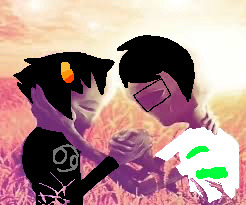
LMAOOOO this is extremely good. truly they are becoming each other's ride or die. bro hold my hand as we bathe in the sun together. bro what if we kissed ... and we were both aliens to each other ....
if i had written homestuck i would have had one of the kids be super into ufology and alien sightings who was both vindicated that aliens are in fact real and horrified that aliens are. Like That
8 notes
·
View notes
Text
June 28, 2010
Homestuck Day 349
New Pages: 2109 - 2114
% Completion (Pages): 26.00
% Completion (Time): 17.29
5 notes
·
View notes
Text
[EOA4] Trolling at the End of the World



TG: i guess im saying be a less shitty troll (p.1589)
Acts 3 and 4 of Homestuck feature a new group of characters, known as ‘the trolls’. carcinoGeneticist, grimAuxiliatrix, gallowsCalibrator, twinArmageddons, and seven others yet unseen, are presented as Internet trolls in their actions and mythological trolls in their appearance. Almost immediately, they’ve captured the interest of fans. Forum posts and Formspring questions reveal endless curiosity about the trolls’ own Sburb session, how they learned about the kids’ session, their connection to the Western zodiac, and more. Their Pesterlogs with the kids average almost three times as long as the kids’ Pesterlogs with each other, and are packed full of exposition, characterization, and antagonism slowly shifting towards friendship.
At the end of Act 4, I set out to close read the trolls’ chatlogs in the context of Internet trolling as a phenomenon, aiming to ask whether the Homestuck trolls’ strategies and intentions reflect those of actual Internet trolls, and whether they achieve their intended outcomes. In other words, are they good at what they do? I quickly realized that the answer to this depends on an entirely different question, one that can’t yet be answered for definite: are the trolls telling the truth?
In this essay I talk about the typical behavior of a 2000s Internet troll, then examine the trolling strategies of each troll who’s interacted with the kids so far. I discuss how well the Homestuck trolls fit the profile of real Internet trolls if they’re being honest with the kids vs if they’re lying, and what this would mean for the story in each case.
[about 8000 words | ao3 mirror | troll pesterlog index | further reading]
Contains spoilers for Homestuck page 1-1988; does not contain any spoilers or information from beyond this point.
By the summer of 2010, Twitter has 40 million active users, while Facebook is approaching 500 million. The Internet is no longer viewed as a social space only for geeks, nerds and people who struggle to make friends in ‘real life’ – it’s becoming an extension of face to face communication, and it’s common practice for young people to share their photographs, life experiences and relationship developments on social media. As a result, terminology once limited to online spaces is receiving mainstream attention. Among this is the ‘troll’, a term which originated on Usenet in the late 1980s and early 1990s, but which many new social media users are encountering for the first time. 2010 sees a British man jailed for eighteen weeks on charges of Internet trolling, bringing the term to courtrooms. Opinion articles in the New York Times as well as major news outlets in the US, UK and Australia report on trolls. A small number of Internet users claim to make hundreds of dollars each month as ‘trolls for hire’. Several academics are beginning to conduct the first major studies on trolling.
It’s in this context that Homestuck begins to introduce its own colorful crowd of trolls. Readers fairly new to the Internet probably know what a troll is and how a double meaning between mythological bridge trolls and real online trolls applies to these characters, while readers who are Internet veterans have almost certainly witnessed trolling, and many will have acted as trolls themselves. However, with information coming from so many possible sources – personal experience, forum culture, new social media, mainstream news outlets, etc – readers probably aren’t all working with the same definition of a ‘troll’, even while they share the broad concept. Research on trolling often begins by describing this uncertainty in how the term is applied, before coming to a working definition for its own analysis.
2010s literature on trolling mostly involves observing trolls ‘in the wild’ on platforms including Usenet, 4chan, Reddit, Facebook, Tumblr, classified ads and newspaper comment threads, analyzing the trolls’ behavior and/or other users’ reactions to it. Some research includes interviews with self-reported trolls or Internet users familiar with trolling. Later research often discusses a shift in trolling culture throughout the 2010s as the ‘real’ and online worlds become increasingly intertwined, as social media links users’ online and offline identities to a greater extent, and as aspects of life such as political campaigning and job applications gain an online dimension. This later research tends more pessimistic, linking a culture of trolling with a rise in reactionary politics. While such research is important in many ways, earlier analyses which focus on the 2000s and even 1990s trolling culture are more relevant for discussing Homestuck, as this is the culture Andrew Hussie is drawing from when creating these characters.
Consequently, I’ve identified a list of features common to trolls operating in the 1990s and 2000s. Trolling manifests differently on every site and even between subcommunities on the same site, so these traits aren’t universal, and any individual troll might strongly embody some of these while disregarding others – Homestuck itself draws attention to the variety of trolling strategies that exist. These are broad trends noticed by multiple researchers studying a range of platforms, but aren’t intended as a comprehensive description of all trolls.
1. Trolls construct a consistent identity for the purpose of trolling. This identity may exist for a single post and then be discarded, or maintained for a long time across multiple instances of trolling. A troll’s constructed identity affects the reception of their trolling.
2. Trolls engage in deception. They misrepresent facts, opinions and intentions, infiltrate groups by pretending to be legitimate members, and hide the fact that they are trolls. The most successful trolls will never be identified as such.
3. Trolls lack emotional investment, and distance themselves from their work. Their primary motivation is entertainment, either their own or that of other people who recognize them as a troll. Trolling is an end in and of itself, not a means to accomplish a goal.
4. Trolling requires engagement. A troll is only successful if they receive their desired reaction, generally other users ‘taking the bait’ and engaging on the troll’s terms.
5. Trolling is an unequal relationship. A troll needs to maintain the upper hand in an interaction, and has more knowledge of the ‘game’ they are playing than their target does.
6. Trolling violates social norms. A troll intentionally behaves in ways they know will be unpopular with other users, and may experiment with how far they can push boundaries in settings where they are unlikely to face consequences.
7. Trolling is intentional. It’s not possible to accidentally troll somebody; it is a conscious decision involving a specific mindset. However, there is no strict binary between trolls and other users. A person may sometimes act as a troll while engaging ‘correctly’ at other times.
8. Trolls negotiate the boundary between irony and sincerity. They may use similar techniques to satire, exaggerating a viewpoint or behavior in order to make fun of it, but they lack clarity of intent. A troll will present their behavior as either joking or serious according to which benefits them most.
9. Trolls do not aim to cause or prevent harm. In some cases, people and communities are harmed by trolling, however this is a side effect that trolls do not work to avoid, instead of the directly intended outcome.
10. Trolls are the ‘natural predators’ of the Internet. They believe that people who choose to be online must accept the presence of trolls, viewing trolling as a natural and desirable consequence of free speech online.
Trolls being deceptive might be the most important aspect from this list, as many of the other aspects describe the ways trolls hide their true identities and motivations, and re-negotiate aspects of their deception to maintain conversational dominance. This list distinguishes trolling from flaming, defined as sending extreme, overtly aggressive messages that are more easily identified, may intend to cause hurt, and often come from a place of genuine emotion. However, it’s not possible to ever know someone’s true motivation, so in practice trolling and flaming can’t always be distinguished in the wild. The list also distinguishes trolling from activism, which may use the same strategies in service of changing people’s viewpoints or advancing a political cause. Of course, trolling has a political dimension like anything else, but it’s only in the 2010s that a large number of trolls begin to claim an active political stance.
In Homestuck, carcinoGeneticist [CG], grimAuxiliatrix [GA], adiosToreador [AT] and gallowsCalibrator [GC] – referred to by their initials from now on – all construct individual troll identities in service of a shared trolling effort. It’s not uncommon for trolls to team up and all target the same community, acting for each other’s entertainment and trying to one-up each other. These four appear to represent a loosely organized group of amateur trolls who have agreed on their core tactic, but have not planned their specific approaches. Their core tactic is convincing John, Rose, Dave and Jade that their Sburb session is doomed, that they will soon make the worst mistake a group of players can make, that this mistake will also negatively impact the trolls, and that this outcome cannot be averted.
As of the end of Act 4, this premise could be either true or false.
carcinoGeneticist
CG: MAYBE YOU SHOULD CONSIDER THAT I WAS BRAGGING TO GET YOUR HOPES UP IN THE FUTURE. CG: ONLY TO LET YOU DOWN. CG: AND THUS TROLL YOU MASTERFULLY IN THAT RESPECT. (p.1903)
CG is the first troll to appear in Homestuck, so from the reader’s perspective, he sets the tone for the whole trolling effort. He types in all uppercase and uses abrasive, insulting language, calling the kids ‘stupid’, ‘idiot’, ‘blithering feculent shithole’, and saying that they’re going to ‘fuck everything up’. This makes his trolling immediately hostile, and he later says to John ‘YOU SEEM TO REALLY GET OFF WHENEVER I FLAME YOU’ (p.1903), which could indicate that he conflates trolling and flaming.
CG’s constructed identity as a rude, unpleasant person seems like the simplest of the trolls’ personas, and the one that varies the least between conversations. Even when CG is later in his own timeline, trying to convince the kids that he’s changed and is now their friend, he can’t help but sneaks in a few jabs. Jade is very suspicious of CG, saying that every time she believes something he says, he laughs at her and calls her a gullible human (p.1525). Possibly, he’s trolled Jade more successfully in earlier parts of her timeline, leading to a complete lack of trust on her part and causing her to block or ignore CG without hearing him out. In this way, she’s better at responding to trolls than Rose or Dave, whose belief that they can out-troll the trolls often works to their detriment.
CG exclusively trolls Jade and John, and most of his interactions with Jade are offscreen. Talking to John, CG expresses frustration with his own strategy, such as criticizing his own decision to troll John backwards in time. He comes across as a highly emotional person who acts without thinking, and even refers to himself changing over time, claiming that earlier in his timeline he was upset, angry and lashing out. Later in his timeline he’s slightly calmer, and ready to work with the kids. This could be read as a troll trying to save face and recover an interaction that isn’t going well for them. If so, his better option would be trolling Dave or Rose instead, and learning from the mistakes he’s made with John. His continuing to troll John might suggest a larger strategy at play.
CG claims he’s resigned to the timeline’s inevitability, and is happy to share information with John, including ‘spoilers’ for Sburb that John shouldn’t learn until later in his quest. This could be simply trying to ruin John’s game experience or birthday for CG’s own entertainment. By presenting information that John can externally verify – for example, the moment John’s Reckoning will occur – CG builds trust between himself and John. He also extends the hand of friendship, telling John early in his timeline that he and CG will eventually become friends, a strategy that makes John less likely to block and ignore him. This, combined with his fairly weak and transparent insults towards John, make him seem harmless and benign despite his unpleasantness.
While he seems impetuous, there are moments when CG plays the long game at the expense of the short. CG copies and pastes messages where John counter-trolls him by claiming that humans hatch from slimy pods (p.1667). As a short term strategy, CG could forgo copying and pasting and staunchly assert that babies don’t exist and humans definitely hatch as larva, despite any argument John makes to the contrary. This would frustrate John and fail to give him future trolling ideas, while CG would be entertaining himself by fighting an argument that has no stakes for him. However, it’s not a strategy that extends beyond a single conversation. CG also concedes ground by admitting that Con Air sounds pretty good based on its summary, even though John’s earnest love of his favorite media could easily be exploited for trolling. By opening himself up to discussing a shared interest in movies, CG again gains John’s trust, and still slips in a small act of trolling by describing Alternian movie titles.
By putting in the work upfront to bond with John, CG primes him to be receptive to – and even look forward to – future trolling attempts. He warns John that the worst trolling is still to come, but that John will actually be happy to receive it (p.1667). It’s clear that John has completely let his guard down around CG, and thinks their relationship is one of equals. It’s highly possible that CG will use this to his advantage in conversations later in John’s timeline, with his weaker, earlier trolling setting John up for an eventual fall.
grimAuxiliatrix
GA: Oh My It Is Your Human Sarcasm Again GA: I Enjoy Listening To It And I Wish Doing So Could Serve As My Primary Form Of Recreation GA: There See I Just Did It Too (p.1093)
GA presents herself as somebody unfamiliar with Earth culture and confused by human interactions. Her syntax plays into this – by capitalizing the first letter of each word while using correct spelling and grammar and excessively formal language, her tone becomes clipped and overly serious, as though she’s uncomfortable relaxing, talking casually or joking around. When the kids reference human culture, GA latches onto the reference to highlight her own lack of understanding about topics including Fred Savage, human mating courtship, and especially sarcasm.
Both Rose and Dave use sarcasm or irony to make themselves seem intelligent or culturally savvy. GA acts as though she genuinely wants to understand sarcasm, but then states that it makes her feel more primitive, combating Rose and Dave’s self-image. With Dave, GA admits that she’s struggling with the trolling effort and solicits his help. Dave prides himself on his understanding of coolness and his ability to – in his opinion – make it seem natural. In his mind, anyone who is openly uncool and can’t figure out how to construct the act is insufferable. GA enters her conversation with Dave pretending to be socially inexperienced and plays into Dave’s belief in his own expertise, setting a trap he won’t be able to resist, a technique AT also employs with Rose. This gets Dave’s attention, distracting him from what he’s trying to accomplish with Sburb. In a moment of highly successful trolling, GA flips from sarcasm to sincerity – when Dave takes her seriously, she states that she’s been practicing sarcasm, and when Dave interprets her followup remark as further sarcasm, she remarks that she was being sincere. It’s likely that she didn’t ‘know’ the sincerity of her own statements in advance, but was simply trying to undercut Dave’s belief in his irony expertise.
When trolling Rose and (unwittingly) John, GA acts as though the trolling is unpleasant for her. She threatens to disengage from her conversation with John, saying she’s ‘not really feeling this’ and later that she’s going to talk to someone else now. In both cases, John actively solicits further trolling. With Rose, GA brings Rose into her confidence by asking her to talk sense into the other kids, singling Rose out as the smartest kid and offering friendship. She’s upfront that she’s taken advice from Dave and entices Rose into discussing Dave’s advice, perhaps knowing that Rose loves to overanalyze her own conversations with Dave. By concentrating the bulk of her trolling efforts on Rose and by exploiting Rose’s high opinion of herself, GA isolates her from her friends, and makes it harder for the kids to compare notes on how to respond to her as a troll.
All four of the trolls’ success is largely due to their increased knowledge and experience of Sburb compared to the kids, and their abilities to move back and forth along the kids’ timelines and monitor their adventures, which the kids can’t do in return. In real life trolling, this isn’t unlike a troll making a new account for their efforts, who’s then able to look through their target’s entire post history to find material to better troll them with, while the target can’t do this in response. GA is able to move back along Rose’s timeline and insert conversation 2=7, where she gives Rose a copy of their first chatlog from GA’s perspective to supply Rose’s future motivation and force her to ‘excruciate over how to subvert the transcription’ (p.1592). Rose simply can’t do this, nor can she immediately skip to their next conversation as GA can. However, once Rose learns that this chatlog came from John using her account, Rose has information that GA does not. While Rose’s belief that she’s good at counter-trolling can be hubristic, in this case she has a legitimate advantage to exploit. For this reason, GA might be the only troll who ends Act 4 unsuccessful in her attempts.
GA is the only troll who interacts with another troll in Act 4, which provides a point of comparison for her behavior. When talking to twinArmageddons, she makes a joke, removing the F1 key from her keyboard when he tells her to press it, and is far more straightforward and upfront with her intent, instead of trying to play games. She also talks far less than TA, engaging as little as possible via instant messaging and preferring to talk to him in person. When talking to the kids GA tends to speak about equally, doesn’t make obvious jokes, and uses complex language to obfuscate her intent.
adiosToreador
AT: bUT i MEAN, gETTING BACK TO THE POINT, oR MAYBE TWO ACTUALLY, AT: tHE FIRST IS YOU SUCK, aND THE SECOND IS HOW i SMACKEDYOUFULLY, AT: (oH YEAH, tHAT RHYME WAS SO ILLLLLLLLL,) (p.1595)
AT constructs the identity of being a shitty troll, which if executed purposefully, could wrap back around to being effective. The first thing Dave says to AT is that he types like a tool – AT uses ‘toggle case’, where the first letter of each clause is lowercase while the rest is in capitals. His only punctuation is commas, and he types in a shade of brown that looks like human waste while using viscerally unpleasant language like ‘digestive ruination’, ‘soiling’ and ‘hornographic’. He fixates on whether he’s using language literally or figuratively, and seems to pay attention to the minutiae of his word choices and sentence construction, sometimes at the expense of guiding the broader conversation. His wording is perhaps intentionally strange and convoluted, and he reacts strongly when he’s misinterpreted as if it’s the other person’s fault for not deciphering his meaning.
It’s common for real trolls to pretend to be less intelligent than they are and unfamiliar with social norms and local communication styles, so AT could be taking this angle. Similarly, it’s common for trolls to pretend to seek advice they don’t actually need as a way of seeking engagement, like how AT solicits advice from Rose on how to troll Dave. Rose celebrates her own intelligence and wordplay, so immediately takes this bait and offers her services on helping AT come up with dope rhymes, at a moment when she’s already busy with Sburb. So, he successfully wastes her time on a pointless exercise, and then gets to annoy her further by saying that he doesn’t need help after all.
AT also employs different techniques based on whether he’s trolling Dave, Rose or Jade. In each case, he chooses the strategy they’re most likely to respond to. He seeks advice from Rose, but with Jade, he pretends to offer advice. He claims to be scared and overwhelmed by how he can see her entire timeline while there’s so much happening, and Jade, who’s similarly grown up with a lot of information about the timeline, relates to this and responds with kindness and sympathy. Here AT trolls her more effectively than CG does, as CG comes on too strong too fast and makes Jade angry enough to block him. AT is able to more subtly scare and upset Jade by telling her about the future – her robot will blow up, there will be a lot of explosions, and she’ll trust CG even though he’s not a nice guy. AT uses the death of his dream self as a bid for compassion from Jade, but in doing so, plants the fear in her mind that dream selves can die. In this way, AT gets a desired reaction without revealing that he’s trolling.
With Dave, AT begins by promising an impressive trolling onslaught, just like CG does with John. On some level Dave wants to be trolled – he likes to be engaged and to flex his ability to counter-troll, but by trolling weakly in the first place, AT denies Dave the opportunity to use his best material. AT also disengages from the conversation just as Dave is starting to get riled up, removing Dave’s chance for a sparring partner. Although it’s rare for trolls to block their targets, AT’s trolling would actually have been more effective if he’d blocked Dave sooner (p.1099) as he’d have further removed Dave’s chance to rant.
Later, when AT bombards Dave with an extended rap, he uses the satire technique where he draws attention to how shitty Dave’s own raps are by writing an even shittier one. Earlier in the story, Dave rapped to John via Pesterchum while John ignored him and occasionally begged him to stop – so AT is essentially showing Dave how he comes across to other people. For the first time, Dave knows what it’s like to be on the receiving end of a rap so bad he doesn’t even want to engage with it, right down to AT’s interjections about the rap’s quality and his completely losing the thread of the rap’s narrative. This strategy has the potential to be very effective, although it requires Dave to both read the rap and to eventually understand that he’s the one being parodied, neither of which are guaranteed.
gallowsCalibrator
GC: G1V3 1T 4 L1TTL3 T4ST3 FOR M3 GC: T3LL M3 WH4T HUM4N BLOOD T4ST3S L1K3 GC: 1V3 B33N SO CUR1OUS >:] (p.1935)
GC also adapts her trolling tactics depending on which kid she’s talking to. The most consistent part of her troll identity is being offputting and invasive, highlighting her alien status. Typing in all caps with 413 leetspeak reinforces this, as the capital letters make her seem aggressive, while the letter replacements create ‘hostile typography’ which is difficult for some people to read. GC’s emoticons are written as ‘>:]’, with the ‘>’ symbol representing her horns, but this same symbol indicates anger in human emoticons. She’s also prone to long bouts of unsettling maniacal laughter.
GC first attempts to troll Rose, who doesn’t betray any emotional reactions as a result of GC’s efforts. Rose tends to assume stupidity instead of trolling, like with her reactions to others’ Sburb GameFAQs back in Act 1, so GC could probably troll Rose well if she wasn’t open about being a troll. Because she makes her intent clear, and because Rose absorbs information quickly and has an outwardly calm demeanor, she doesn’t give GC the reaction she’s looking for. In the end, GC’s only remaining tactic is to flex her mastery over time, pointing out that she can contact Rose again immediately from her perspective, while Rose will have to wait (and is still waiting, as of the end of act 4).
Trolling John and Dave is more effective. With Dave, she identifies aspects of his image that he works hard to maintain, and tries to expose the truth below them – needling at his ‘cool guy’ persona, his relationship with his bro, and his reaction to finding his own corpse. She takes advantage of his weaknesses, but does not allow herself to have any. Dave tries to poke fun at her blindness – the only piece of potentially sensitive information he knows about her – but she counters this well by playing up her own sensory experiences with smell and taste that he doesn’t get to share. With John, her tactics are different again, and she at least pretends to have weaknesses. She claims to be sensitive about both her blindness and leetspeaking, accusing John of making fun of her handicap. She knows that John, unlike Dave, will feel bad and apologize.
GC is good at adapting in the moment when she notices a technique failing. John doesn’t respond well when GC says she wants to mess with him, so she quickly switches to wanting to mess with the timeline. After getting John killed, she renegotiates intent, moving seamlessly from ‘I knew it wouldn’t work’ to ‘I guessed there was a chance it would work, but the timeline would adapt’ to ‘but I didn’t think I’d actually be complicit in the timeline’ to ‘I guess I’m a bad troll and I feel bad’ to ‘actually, I’m more powerful than you, so I’ll troll you too’ all in a single conversation with Davesprite (p.1657) – and later with John, she shifts between ‘I feel bad about killing you’ to ‘you never died so there’s no reason to be mad’ to ‘I understand that you’re mad and I want to earn your trust back’ (p.1684). In both cases, she changes her motivation sentence by sentence according to what she thinks her conversation partner will respond well to, regardless of her true feelings.
GC doles out her knowledge of Sburb on her own terms to maintain the upper hand in conversation. Although she has a map of John’s whole planet, she only gives him access to small parts. She also tells John that killing his denizen will release a grist hoard for the Ultimate Alchemy, but refuses to define what this is – in a way, behaving similarly to a sprite, and creating dependence by suggesting that without her, John has no chance of success. This goes beyond Sburb knowledge and extends to her professing knowledge of John as a person, telling him to ‘DO WH4T 1 S4Y / YOU KNOW YOUR3 GO1NG TO 3V3NTU4LLY 4NYW4Y’ (p.1579). This maintains the power imbalance, as John knows next to nothing about her.
A successful tactic from GC is her giving John the rocketpack code ‘PCHOOOOO’ without making it clear that it’s a captcha code (p.1634-5). When he’s confused as to why she hasn’t returned with the code, she gets to say that she already gave it, even though she was intentionally vague with it. She’s wasted his time, and he’s thrown off for the rest of the conversation – he’s annoyed by her poor communication, but because she did give him the code and can frame herself as considerate for doing so, he’s the one who comes across badly in his justified annoyance. Not playing fairly while presenting herself as the more rational party is a classic trolling technique.
Group strategy
Comparing the strategies of all four trolls, their efforts could possibly be classified as ‘meta-trolling’. All four are upfront about being trolls, causing the kids to approach their interactions within the troll-target framework, and respond accordingly. Sometimes, they even detail their specific trolling strategies. This is very rare for trolls, who usually don’t announce themselves and thrive on staying unnoticed. However, a common strategy for combating trolls is by noticing that they’re trolls and pointing this out, which destroys whatever image the troll has constructed. This strategy is not possible for the kids, as the trolls have already admitted to being trolls.
It’s possible, of course, that the trolls are trying their best, but are truly and honestly bad at trolling. But in the same way that Dave sees himself as on multiple layers of irony, it’s possible to read the trolls as being on multiple layers of trolling. If they’re intentionally constructing the identity of being ineffective trolls, the kids will underestimate them, and the trolls will be able to slip their true strategies under the radar. All four trolls make at least one reference to feeling like their strategies are failing, which could simply be another layer of the lie.
So, with the trolls’ individual and group techniques in mind, how well do they conform to the common attributes of trolls found in research?
Scenario 1: The trolls are telling the truth.
As a group, the trolls are very informative. However, they control the flow of information and come from a privileged position as players much further in Sburb, presenting themself as game guides on the same level as exiles and sprites. A fair amount of information they give can be backed up with external evidence, some of which is known to the kids (for example, CG sharing in advance that Jade’s dreambot will blow up) and some only to the audience (for example, Jack’s ascension, or even the simple fact that the trolls are able to troll nonlinearly). Although some of the kids show early skepticism, by the end of Act 4, all four kids appear to completely believe the trolls’ core claim that the kids’ session is doomed, and that their future actions will somehow come to negatively affect the trolls, too. If we, like the kids, accept the premise that the trolls are telling the truth to the best of their ability, they fulfill some but not all of the common attributes of trolls.
The trolls still engage in identity construction (Attribute #1), using chumhandles, syntax, language and strategy to show the kids a specific angle of their personality. They have an unequal relationship with the kids (#5), both through their increased knowledge of Sburb and their privileged position with respect to the kids’ timelines. They violate social norms (#6), willing to be rude, violent and insulting, and to continue sending unsolicited messages even when blocked and asked to leave. They are trolling intentionally (#7), with an explicit and stated intent to do so, even while some of their interactions might cross the boundary between trolling and legitimate engagement, and they are negotiating between irony and sincerity (#8) in their regular attempts to change their constructed identities and presentation of their own goals in response to the kids’ messages.
However, the trolls do not engage in deception (Attribute #2) except possibly for lies of omission, such as GC not defining what exactly the Ultimate Alchemy is, instead predicating all their trolling attempts on honest disclosure. They don’t maintain emotional distance (#3) as they have as strong a personal investment in the outcome of the kids’ session as the kids themselves do, and are trying to accomplish a goal beyond mere entertainment. They don’t necessarily require engagement (#4), as they believe that nothing can be changed and that paradox space will compensate for any attempted timeline alterations, making their trolling more about venting frustration than about getting the kids to act differently. In some cases, they’re actively trying to cause harm (#9), with GC in particular seeking to punish the kids for their behavior – going so far as to get John killed – taking acts of revenge for the kids’ harming the trolls. Finally, they’re not acting as ‘natural predators’ (#10), as they are targeting a specific group for a specific reason, and there’s no indication that the trolls would engage in trolling under other circumstances.
Scenario 2: The trolls are lying.
If we take a contrasting view, and consider that we can only trust the trolls’ information if it has been backed up by external evidence in the comic, things look very different. Several of their claims are called into question. Some of these are small – for example, GC noticing her exile’s voice immediately upon entering the Medium could be a lie used to gain Rose’s respect when Rose reveals that the White Queen’s commands are obvious to her, and AT saying that the only time he had fun playing Sburb was while dreaming on Prospit could be a lie used to gain compassion from the often empathetic Jade. Other lies could be much bigger. It’s possible that the trolls did not successfully beat their Black King, that all of their dream selves are still alive, that there is no such thing as the Rift, that the kids don’t actually fuck up their session in the version of the timeline the trolls see, and that any actions taken by the kids don’t affect the trolls at all.
If the trolls are lying, I would argue that they embody every one of the common trolling attributes. Their identity construction (Attribute #1) is much stronger and more deliberate, and likely differs more from their personalities around each other than if they’re telling the truth. They are by definition engaging in deception (#2), and they can maintain significant emotional distance (#3) if whatever happens to the kids actually has no impact on the trolls. They do require engagement (#4), as their motivation becomes their own entertainment supplied by the kids’ reaction to their trolling, and possibly each other’s reactions to their individual trolling attempts. Their relationship with the kids is even more unequal (#5), as they are successfully presenting false information as true, and they are violating social norms even more strongly (#6) by making disingenuous offers of help and friendship that they intend to retract.
Their trolling remains intentional (#7), and it’s less likely that they’re ever engaging legitimately with the kids – though they may be doing so with each other, contrasting their trolling and non-trolling interactions. They are still negotiating irony and sincerity (#8) in how they present their motivations, and it may be possible for them to portray more of their deception as simply harmless joking, if called out on their actions. They are less likely to care whether or not the kids suffer actual harm as a result of the trolling (#9), far more concerned with their own reactions than any acts of revenge. Finally, CG’s dismissive statements about Sburb’s puzzles, poetry and symbolism (p.1903) could suggest that the trolls view themselves as a counterbalancing force who bring a reality check to the game, fulfilling the ‘natural predator’ criteria (#10).
Discussion
TT: But you see, it's not that I don't understand you. TT: It's just that I don't believe you. TT: Because it's nonsense. TT: Albeit persistent and coordinated nonsense. TT: Why would a bunch of temporally dislocated trolls want to harass a group of friends throughout completely random points in time? (p.1093)
Merritt (2012) conducts similar discourse analysis for trolls on Reddit in a similar time period to the Homestuck trolls’ introduction. According to her, trolls believe that being online requires a ‘certain level of comfort with the idea that not all information encountered on the web is or should be correct’. Trolls expect other Internet users to approach online interactions with a healthy dose of suspicion and social mastery, and in their mind, falling for their tricks is equivalent to believing that ‘gullible’ is written on the ceiling. I think it’s only fair to extend this same suspicion to literature about trolls, and to wait for evidence before trusting the trolls’ claims about the kids’ future.
So, what reason do the trolls have to lie to the kids? Either way, what’s in it for them? Visuals of the trolls throughout the act show them in a neutral gray computer lab, filled with wires, pipes and chipboard, while grimAuxiliatrix and twinArmageddons discuss TA’s setting up ‘stations’ for the group (p.1715). The general aesthetic matches with the ectobiology lab John explores later in the act. CG’s claim that the trolls are hiding in a lab in what’s left of the Veil seems believable – as such, they’re stuck in their Sburb session, currently unable to progress any further.
The trolls’ civilization has been destroyed, so they’re probably not doing well emotionally, and their session has either failed or glitched, so they don’t have many options for their future. In a state of boredom and frustration, and with a hacker who can access computer networks tied to other Sburb sessions, trolling is one of their few options for passing the time. The kids may have no real ties to the trolls’ session – the trolls may have simply identified a group of easy targets, perhaps a group poised to actually succeed at Sburb, and are entertaining themselves by throwing wrenches, annoyances and spoilers into the group. If they’ve seen the kids actually solve the Ultimate Riddle, they’re probably jealous of the kids’ win. Perhaps they’re trying to actively sabotage their game, perhaps they believe such sabotage is impossible due to the predestination of the outcome, or most likely, they don’t care either way and are just venting their resentment. It’s also possible the kids aren’t the only group they’re trolling, and that they’ll simply move onto another when they get bored.
If the trolls are lying, I think they’ve come up with something believable – claiming that the kids’ session will go wrong enough to also affect the trolls seems implausible at first glance, but provides them with an obvious motivation. Claiming to act in self interest is highly believable, and portraying themselves as desperate makes it easier for the kids to overlook any inconsistencies in their story. The trolls’ story also gives them a reason to concentrate on a small group of targets, which in turn allows them to develop hyperspecific strategies tailored to each kid, without any suspicion as to why the trolls are so focused on them. It’s also possible that they’ve configured Trollian to allow them to silently observe each other’s conversations to ensure their strategies match up, and are a much more organized, consistent and capable group than they first appear, and that most of their incompetence is a calculated act.
In a flashback, Jade and John theorize about the trolls’ motivations. John thinks they’re ‘a pain in the ass’ and the ‘shittiest pranksters ever’ (p.1000) while Jade thinks they are ‘mostly harmless’ and ‘some of them are kind of funny’, as well as saying she’s ‘never had any sort of feeling about them’ – code for never seeing visions of them in the clouds of Skaia. If Jade hasn’t seen these visions, can the trolls really be that important? The trolls being liars only targeting the kids for their own entertainment would fit well with this, while the kids’ and trolls’ sessions being intrinsically linked should be ‘known’ by Skaia.
The kids consider themselves very separate from the trolls, confining them to the separate ‘Trollslum’ section of the Pesterchum contacts list, which might be for blocked users. And in a literal way, they’re right – the trolls aren’t just a different friend group from a different part of the Internet, they’re a whole other species. Creating an alien species of ‘trolls’ to act in opposition to the ‘normal Internet users’ represented by the kids seems on the surface that it’s creating a false binary between trolls and non-trolls, but it’s not quite so simple. Long before the trolls appear, we learn that Dave ‘maintain[s] a number of IRONICALLY HUMOROUS BLOGS, WEBSITES, AND SOCIAL NETWORKING PROFILES’ (p.312) – profiles where he’s constructed an identity to post under, with the goal that his followers are ‘totally convinced of [his] creative persona's sincerity’ (p.326). In short, pre-Sburb Dave regularly trolls others. He also mentions finding some of his brother’s comics ‘a little TOO ironic’ (p.566), showing that the Striders draw different lines between what’s funny and what isn’t, instead of these being fixed concepts.
Rose and Dave’s conversations provide another example, particularly their first chatlog (p.333). Rose might be trolling Dave here, pretending to buy into Dave’s inflated self image while really making fun of him to herself. Rose’s GameFAQs, on the other hand, are not trolling and are genuine attempts to help others through the game, but someone unfamiliar with Sburb, or with Rose, may well interpret them as trolling. On the other side, the trolls engage sincerely with each other, and twinArmageddons, despite being a ‘troll’ by species, refuses to troll the kids at all, as does the troll in charge of timeline management (p.1657). So the species binary is already called into question, with Rose and Dave especially providing examples of Internet users who are sometimes honest participants, sometimes trolls.
Narratively, the trolls telling the truth is a simpler possibility. It’s easier for both writer and readers to keep track of, and it gives clear shape to the overall story of the kids trying to subvert the bad outcome of their Sburb session and save the trolls in the process, as well as setting up themes of predestination and building friendship in unlikely places. It allows readers to get to know these characters and form opinions on them, perhaps sitting with the contradiction that while the trolls aren’t good or kind people, they probably don’t deserve whatever fate Skaia has placed upon them. It suggests that people’s actions aren’t due to some inherent evil living within them, but result from the circumstances they’re thrust into. It lets them be confused, disorganized and inept just like the kids often are, setting up narrative parallels between the groups as the trolls try their best to mess with the kids and stumble into surprising success just as often as they fall into predictable failure. It portrays the trolls as scared, lonely kids, the final survivors of their species who have already suffered enough trauma within Sburb, and are desperate to avoid any more.
The trolls lying about the kids’ fate would be a much bolder choice, and perhaps more difficult to write well. Instead of unreliable narrators, Homestuck would present a group of unreliable side characters, not unlike the Sburb ‘hackers’ suggested by Rose’s GameFAQs (p.510). These characters’ entire role in the story would be to work against the kids, and they likely wouldn’t be explored outside this context, which would suggest that people should be judged by their actions and outcomes, instead of their backgrounds and motivations. The trolls may be stuck, their game unable to progress, but they’re still making the choice to mess with the kids and risk negative impacts on their own session. Even though the species binary has been called into question, this option presents a stronger ‘us vs them’ mentality, and a much clearer divide between protagonist and antagonist. Once the twist has been revealed, however, the story could ask if anything can or should be done to help the trolls – and however many other failed Sburb sessions’ players are stuck in their own Incipispheres – despite the actions they’ve taken against the kids. The knowledge that players who survive the game but don’t win are eternally trapped would provide more motivation for breaking the game itself, as Rose’s final GameFAQ entry points towards.
The trolls lying would also accurately reflect many people’s Internet experience, presenting a more realistic scenario where people and information found online can’t always be trusted. Whether we take a troll’s perspective, where the prevalence of deception and misinformation online is either necessary or actively beneficial as it promotes an environment where users can exercise freedom of speech, or an anti-troll perspective, where measures should be taken to combat any deception that has a chance of causing real harm, it’s still true that trolls have been part of the Internet since its early days and show no sign of going anywhere. Literature about trolls can represent a fantasy where perceived trolls are in fact people who should be taken seriously, reached out to and worked with, or it can represent a reality where trolls should be mistrusted, and where users should be suspicious of others’ intentions at all times in the absence of hard evidence. I don’t think there’s a ‘right’ or ‘wrong angle to take, but the first suggests an author taking an idealist or escapist viewpoint, and the second, a cynical and realist viewpoint.
From what I’ve seen, most real time readers don’t even consider the possibility that the trolls are lying. They’re approaching the characters and situation on the assumption that the trolls are honest, and wouldn’t expect the bait and switch. As such, a reveal that the trolls are lying would equate to Andrew Hussie trolling the readers, as well as the trolls trolling the kids.
When someone realizes they’ve been trolled on the Internet, they can respond in different ways: they can disengage from the conversation, angrily flame the troll in retort, call for more effective community moderation, warn other users about this troll and how to spot them, leave the community entirely, log off, go outside, carry the hurt with them or cast off the memory. Or, they can congratulate the troll, see the humor in the situation, look over the interaction from an outsider’s perspective, screenshot and share with friends, take inspiration for their own future trolling, view this as simply part of the online experience. Again, none of these responses are necessarily right or wrong. We’re all looking for something slightly different out of the Internet, and we’re all looking for something different from stories. I can imagine this twist getting strong reactions from fans in both directions, making it, in essence, successful trolling.
Conclusions
EB: this is like some terrible april fools prank. (p.1649)
While researching this essay, I thought I’d come to the conclusion that the trolls are successful trolls if they’re lying to the kids, but ineffective if they’re telling the truth. Now, I think it’s more complex. All four trolls do a good job of frustrating and distracting the kids, getting them to continually engage in conversations despite their tight Sburb timelines, and confusing the kids about their true intentions by constantly renegotiating their identities. They make themselves into a force the kids have no choice but to deal with, and in many cases, actively seek interaction with. They’re all good at maintaining conversational dominance both through their superior technology and through social and linguistic means. That’s all true regardless of their true intent.
Since the beginning of Homestuck, John Egbert has demonstrated the desire to entertain others, via his pranks and magic tricks, and to be entertained himself, via his favorite movies and video games. The more difficult and hopeless life gets, the more important it is to have fun – John re-enacting Con Air just minutes before his Reckoning begins (p.1931) is testament to this. The trolls represent a darker side of this desire, as people who are happy for their entertainment to come at the expense of others’ comfort. And it’s fair to ask why the trolls find it fun to cause havoc in the kids’ Sburb session, as even if they are telling the truth, it’s unlikely that the kids intentionally harmed the trolls.
However, it’s hard to truly speculate on the trolls’ morality, and while I don’t think they’re kind people, it’s hard to judge them too harshly. According to twinArmageddons, the trolls are soon going to die (p.1715). When their entire home planet has been destroyed, when their world has narrowed to twelve teammates on a discarded meteor whose transtemporal computer networks show them other people having adventures, carrying hope, and living a life they can never return to, it’s not all that surprising that the trolls are trying to distract themselves from their reality by using their last gasps to mess with the kids. In the real world, I think that some trolls can be cruel, prey on the weak, seek power over others and feel no remorse. In Homestuck, even if the trolls are lying, I’m willing to extend them some sympathy. At the end of the world, there’s not much fun left to be had.
#homestuck#analysis#eoa4#milestone#trolling#theory#trying out different writing styles i figured id do research for this but less actual citations more general summarizing#which might make it feel more accessible and easy to read#or might make it seem like i havent backed up my claims and am pulling shit out of my ass#i don’t know but lmk if you have opinions!!#also i want to believe that in 2010 i could have convinced people of this for real#id have been conspiracy theorizing all over the mspa forums like WAKE UP HOMESTUCKS!!!!#but even now. this was a blast to write and a great topic to research. i am enriched to know more abt trolls <3#chrono
13 notes
·
View notes
Text
June 27, 2010
Homestuck Day 348
New Pages: 2100 - 2108
% Completion (Pages): 25.93
% Completion (Time): 17.25
Notes: Introduction of Tavros Nitram
3 notes
·
View notes